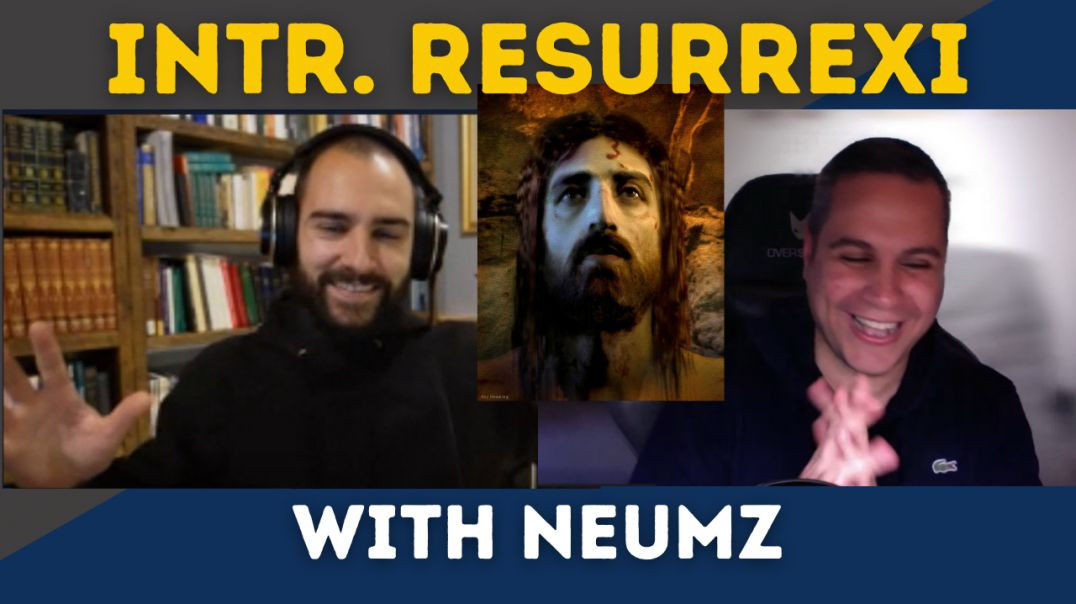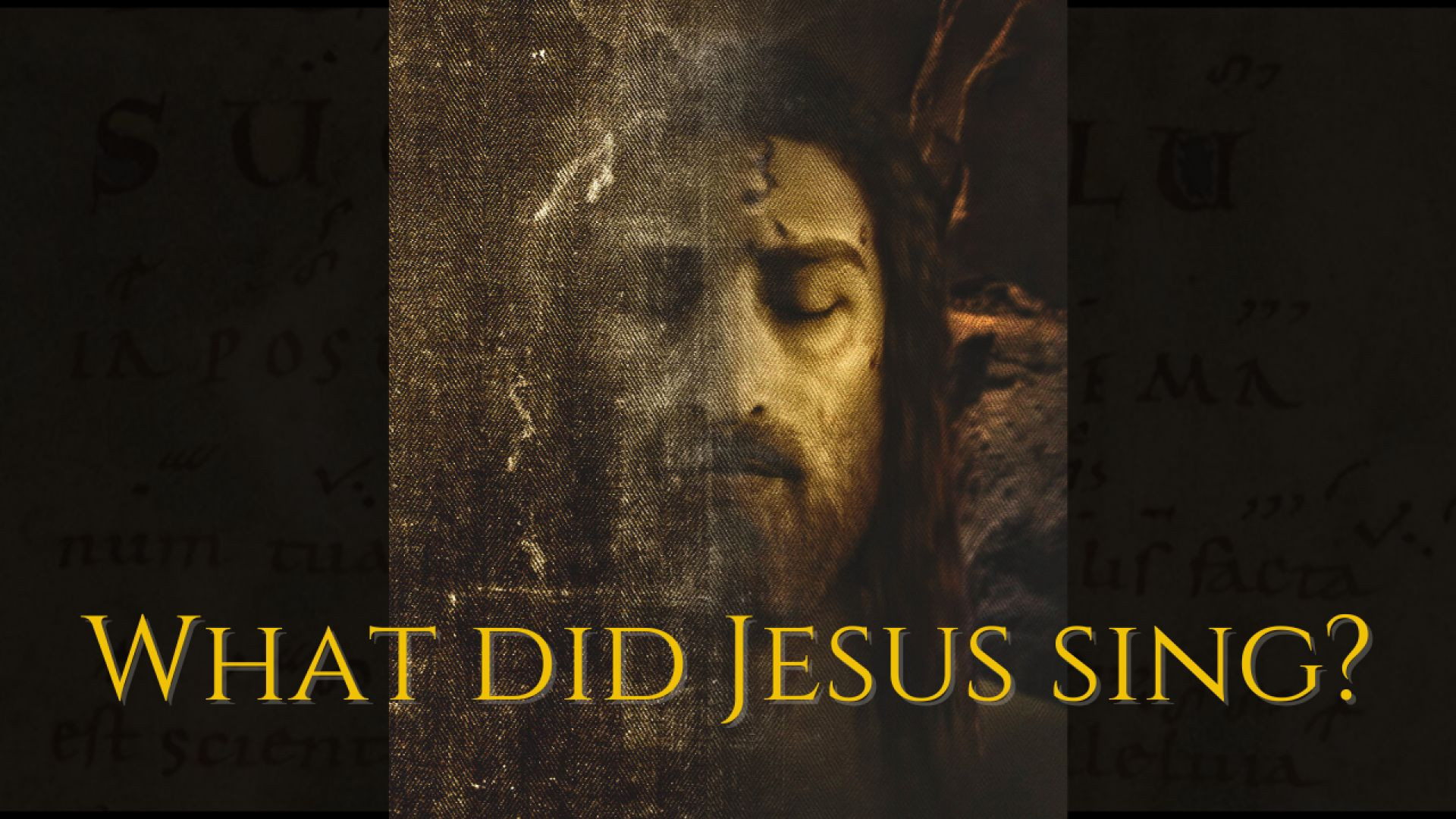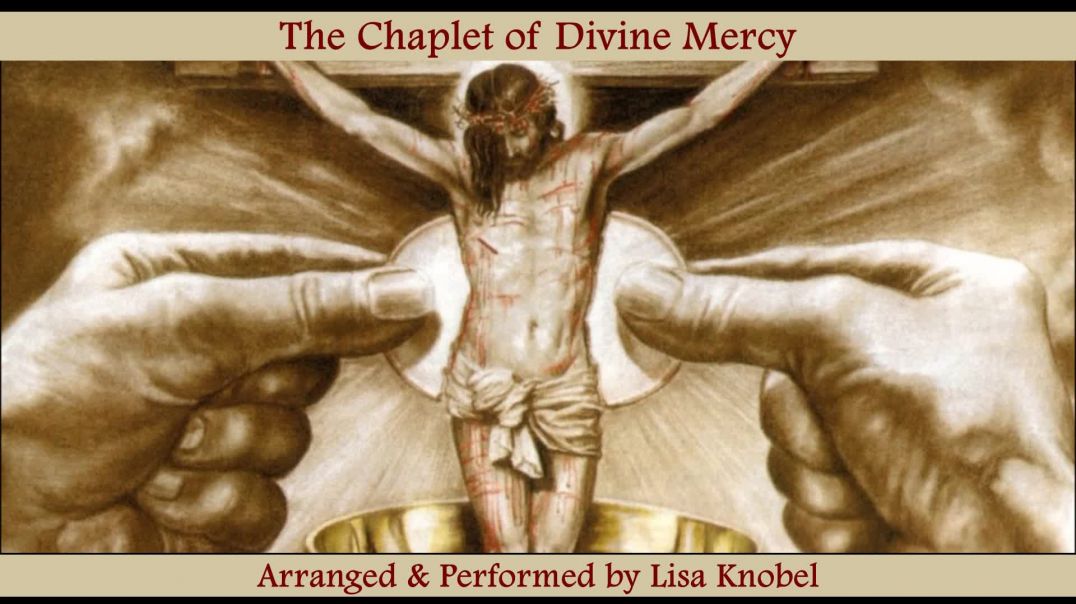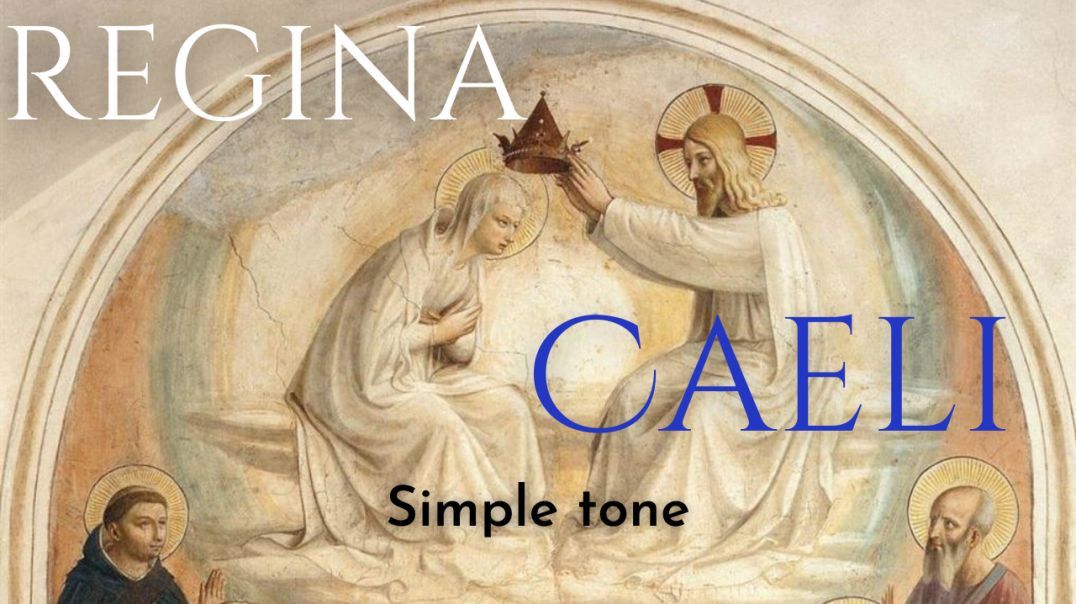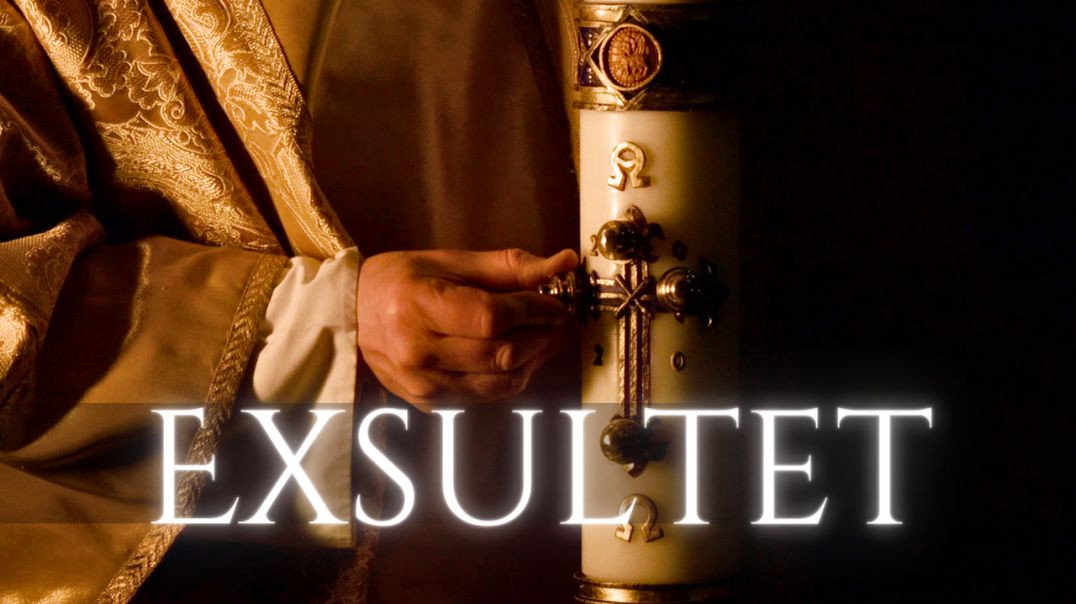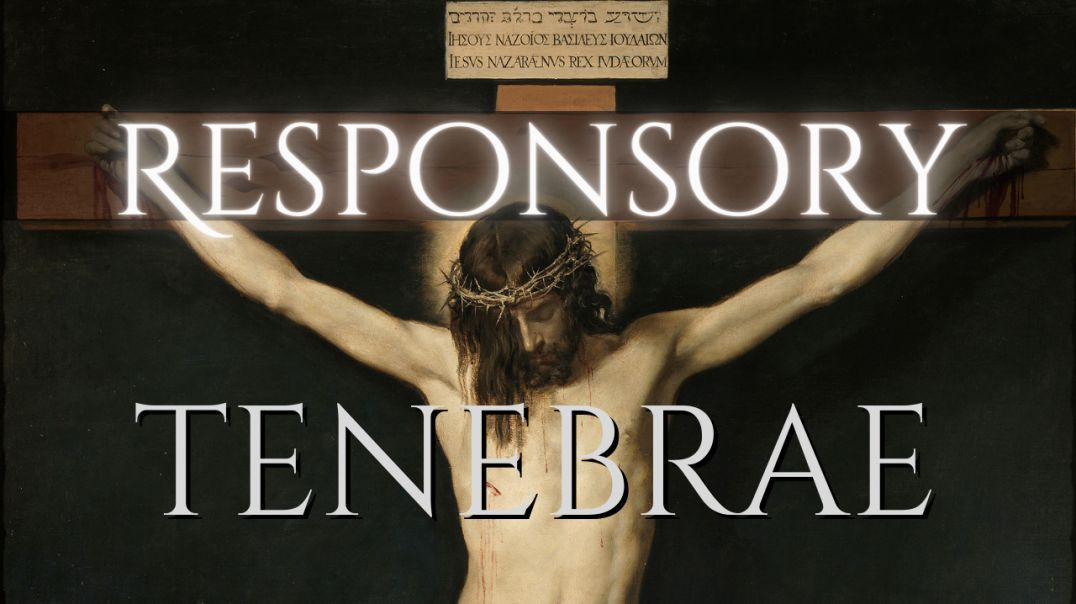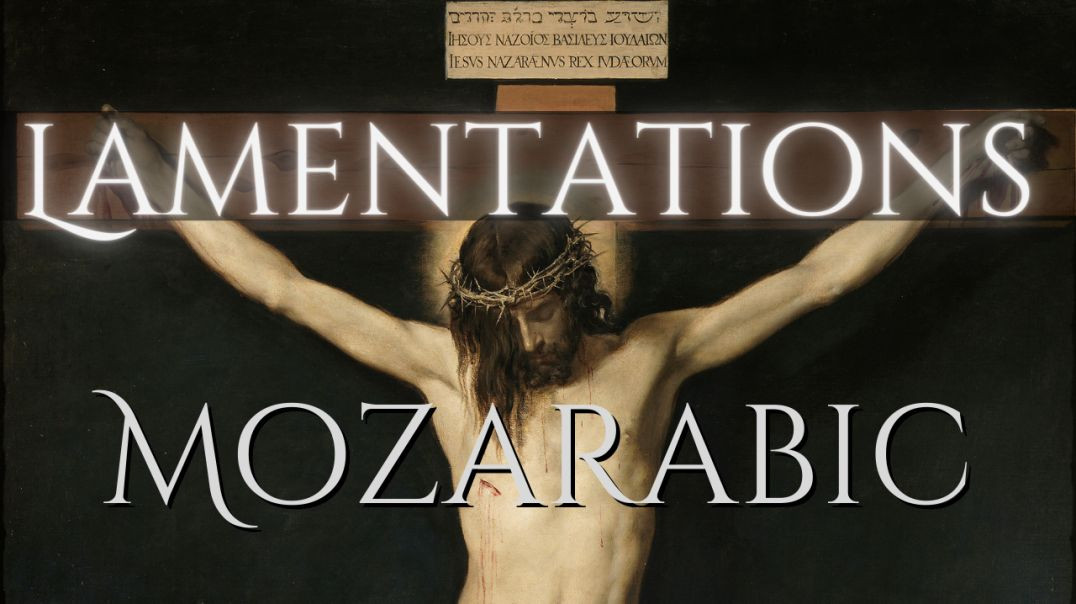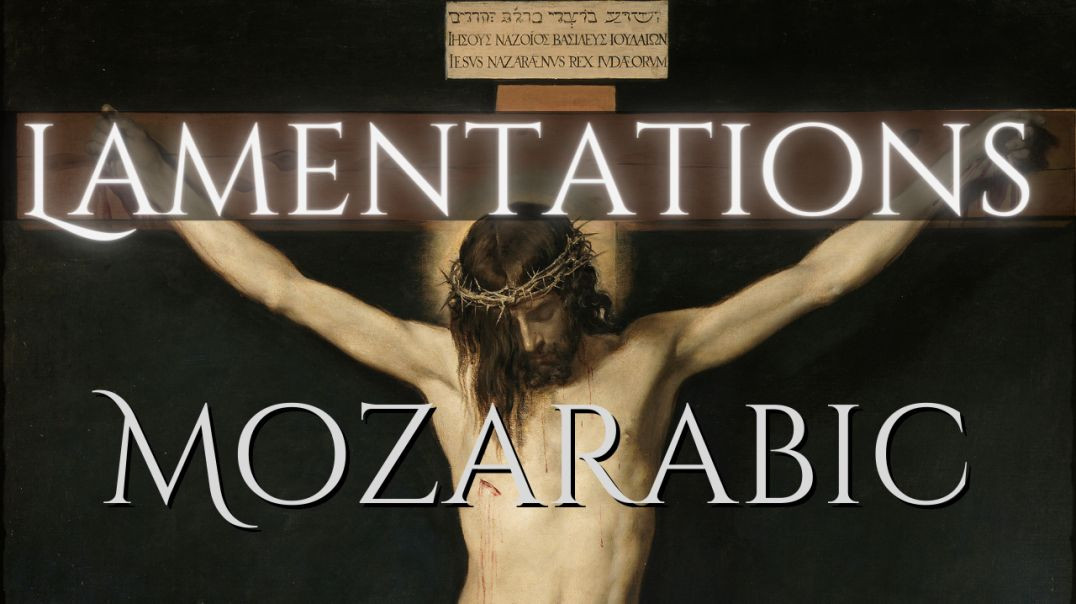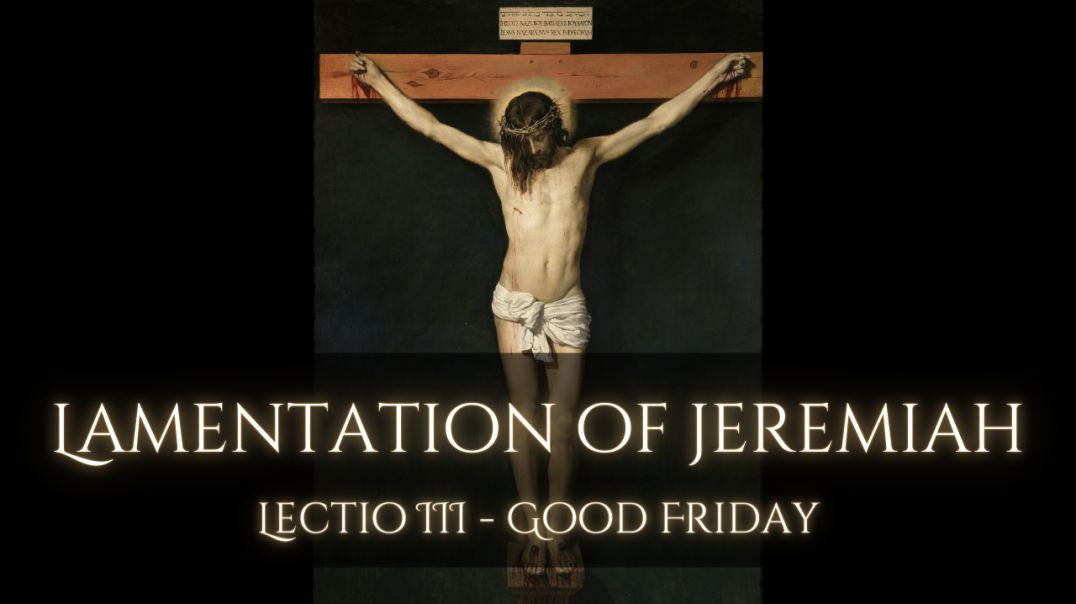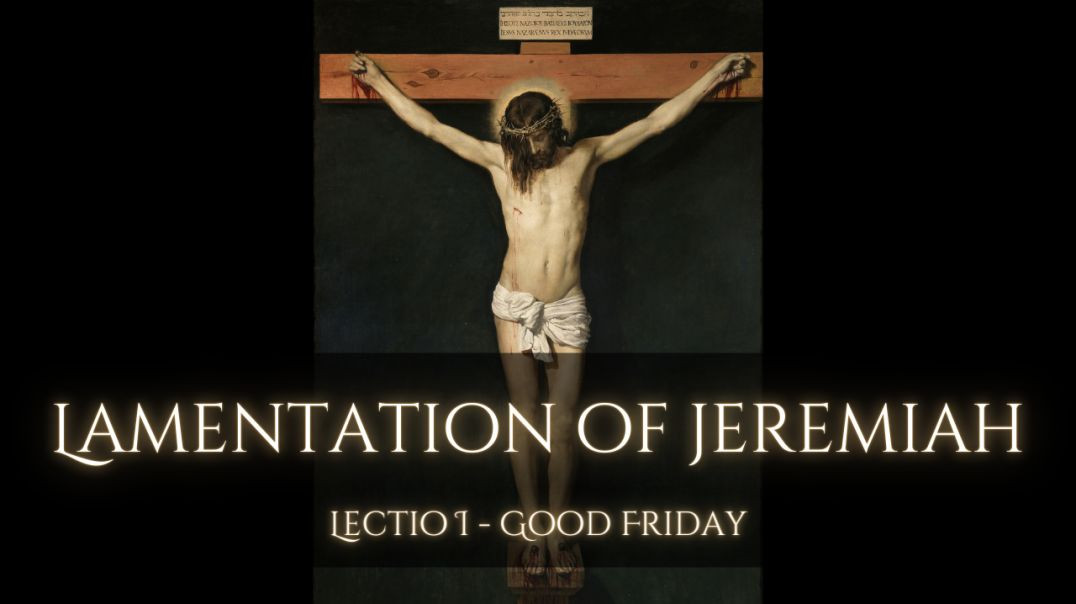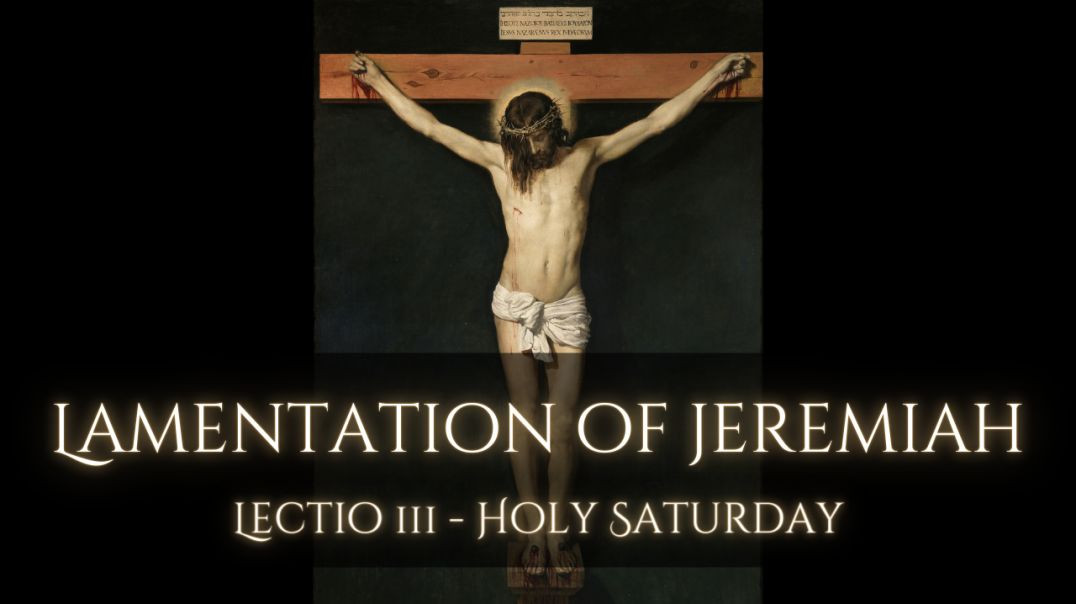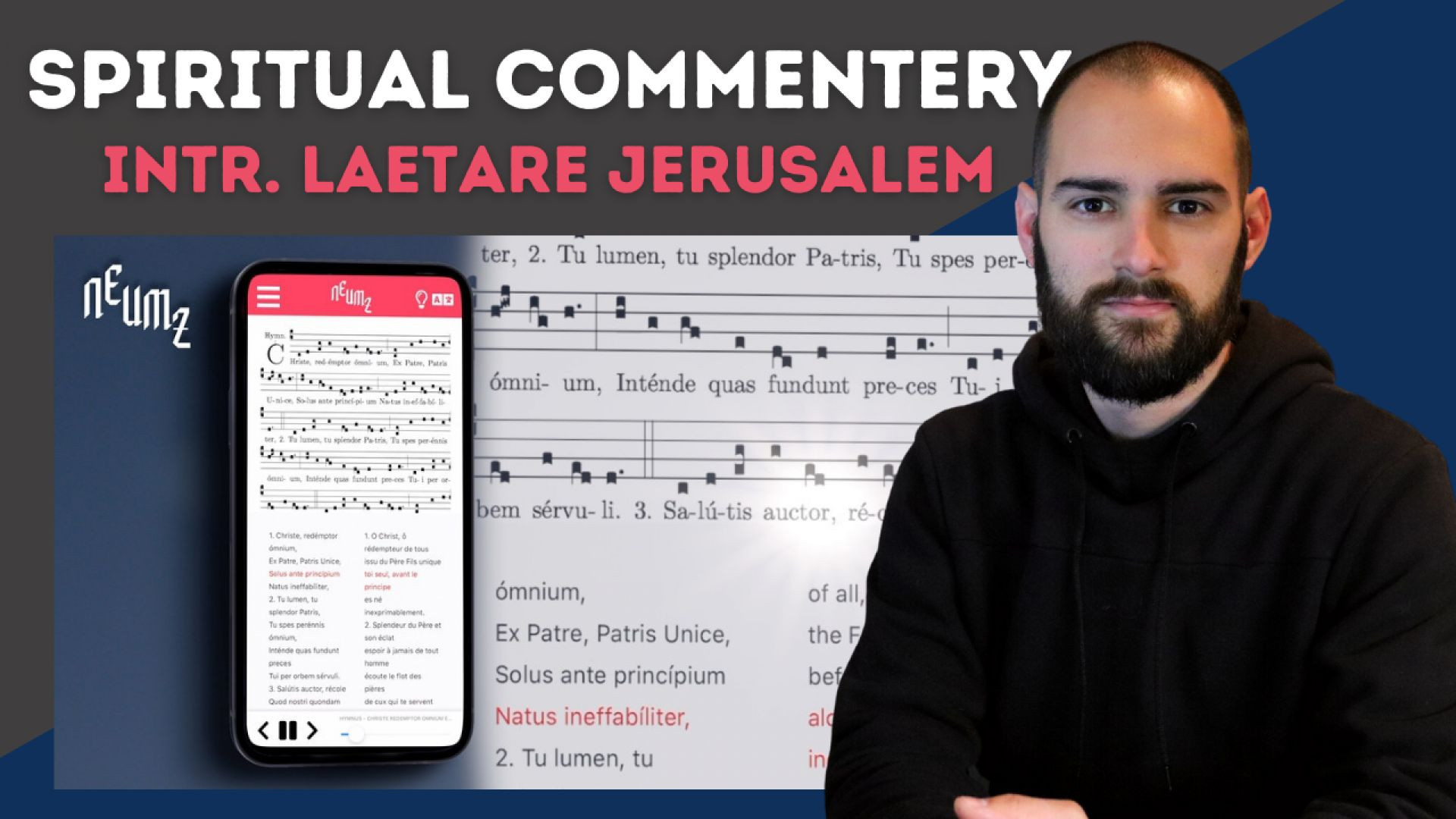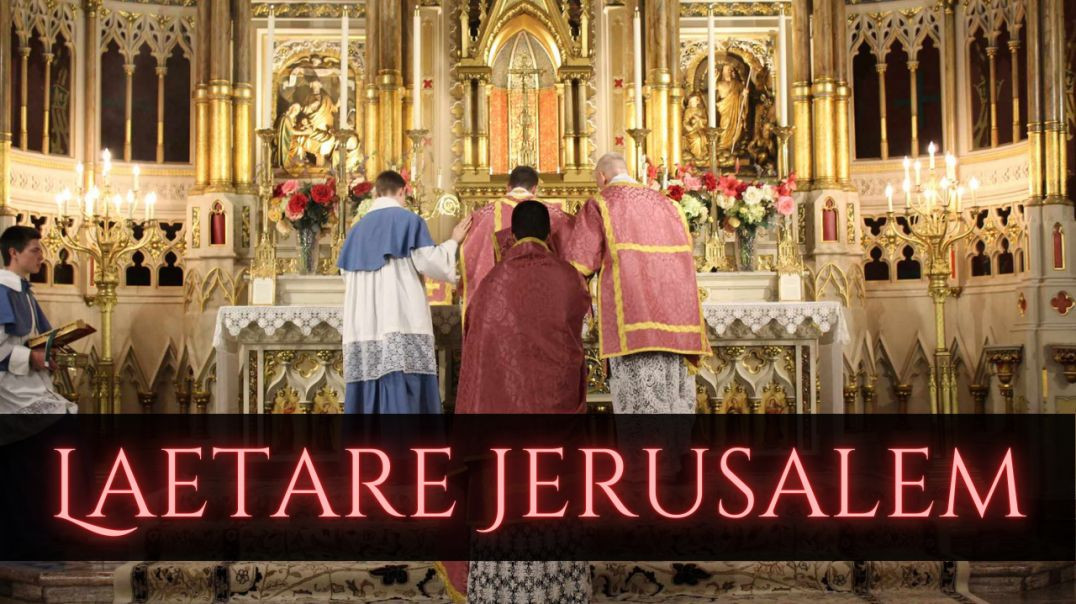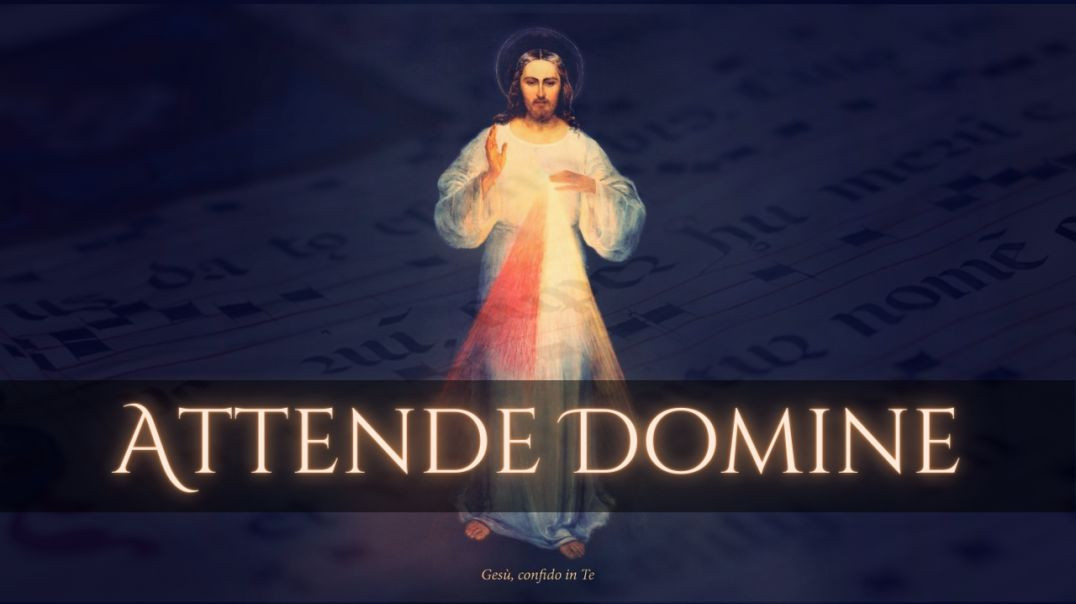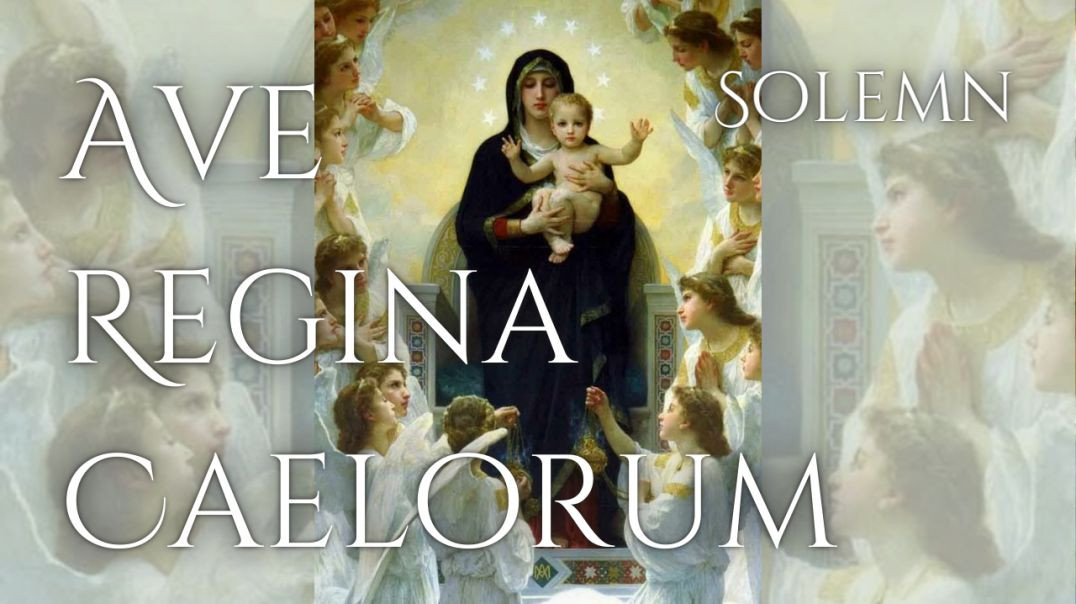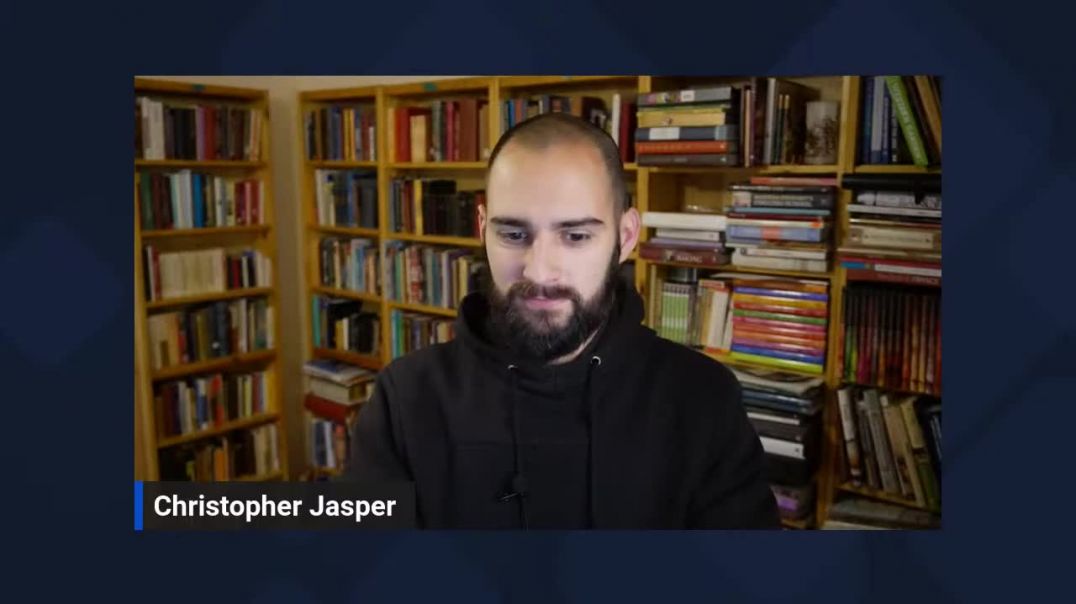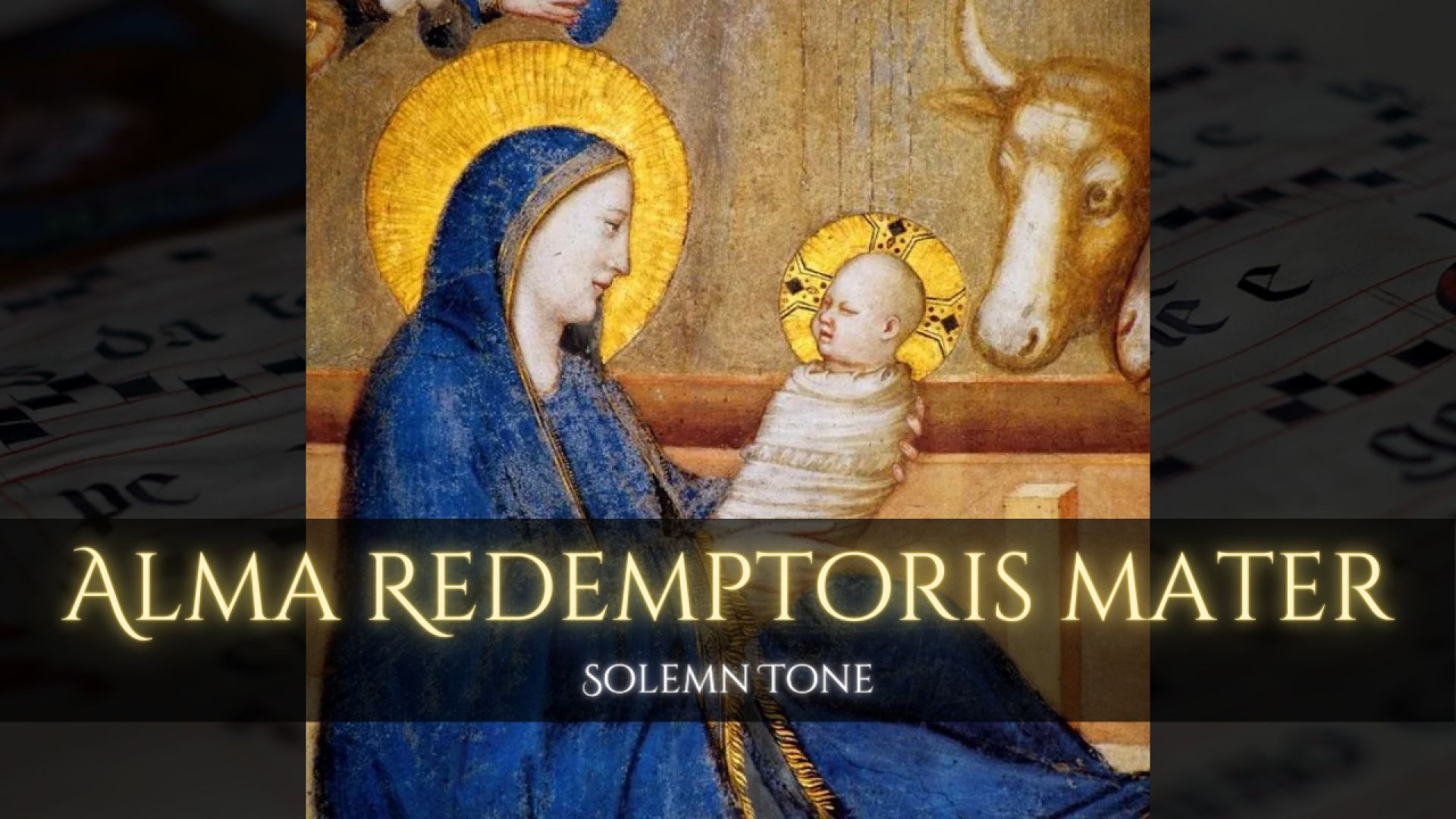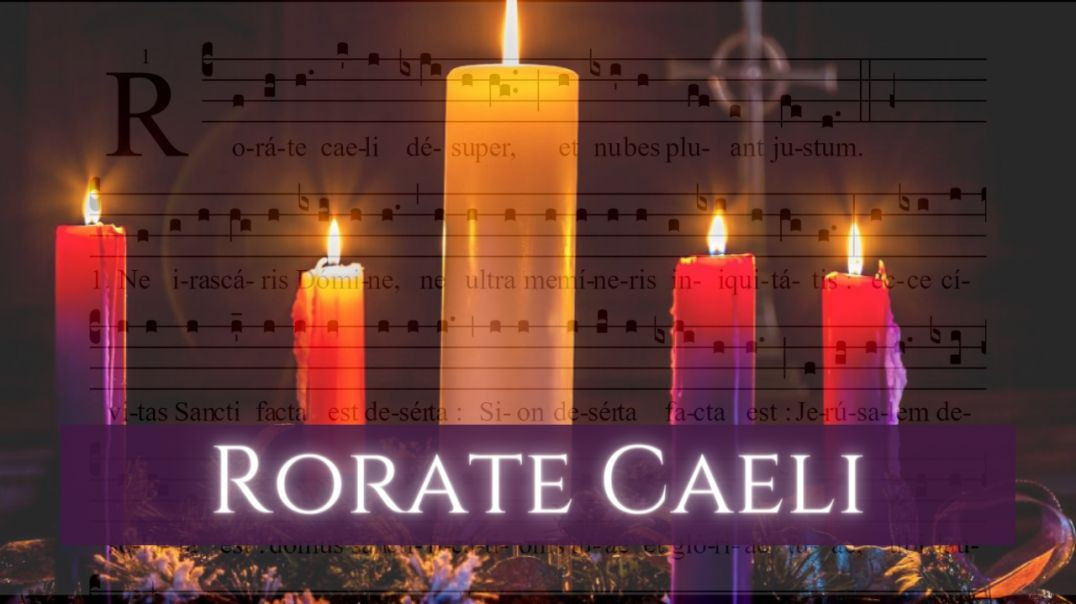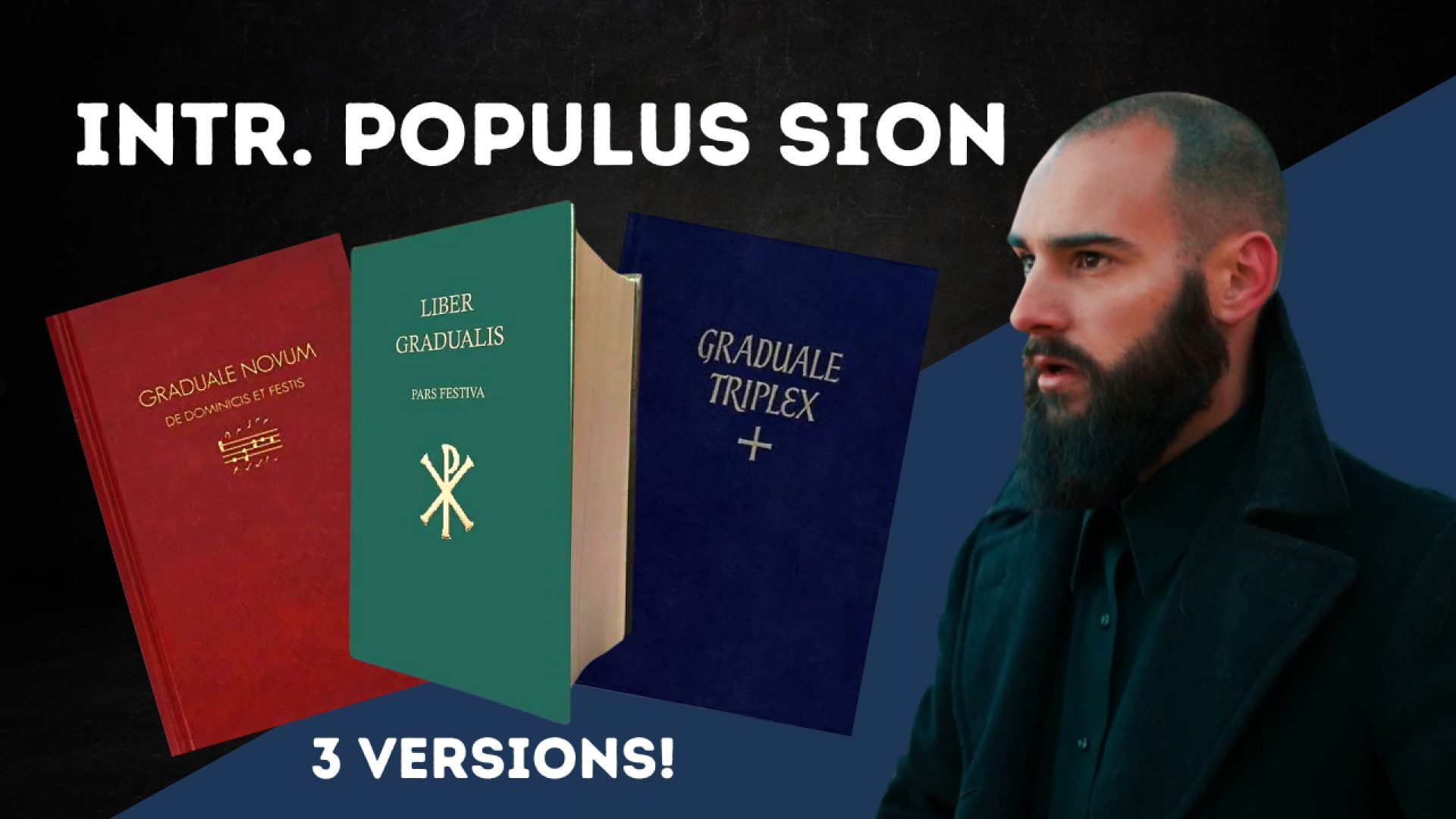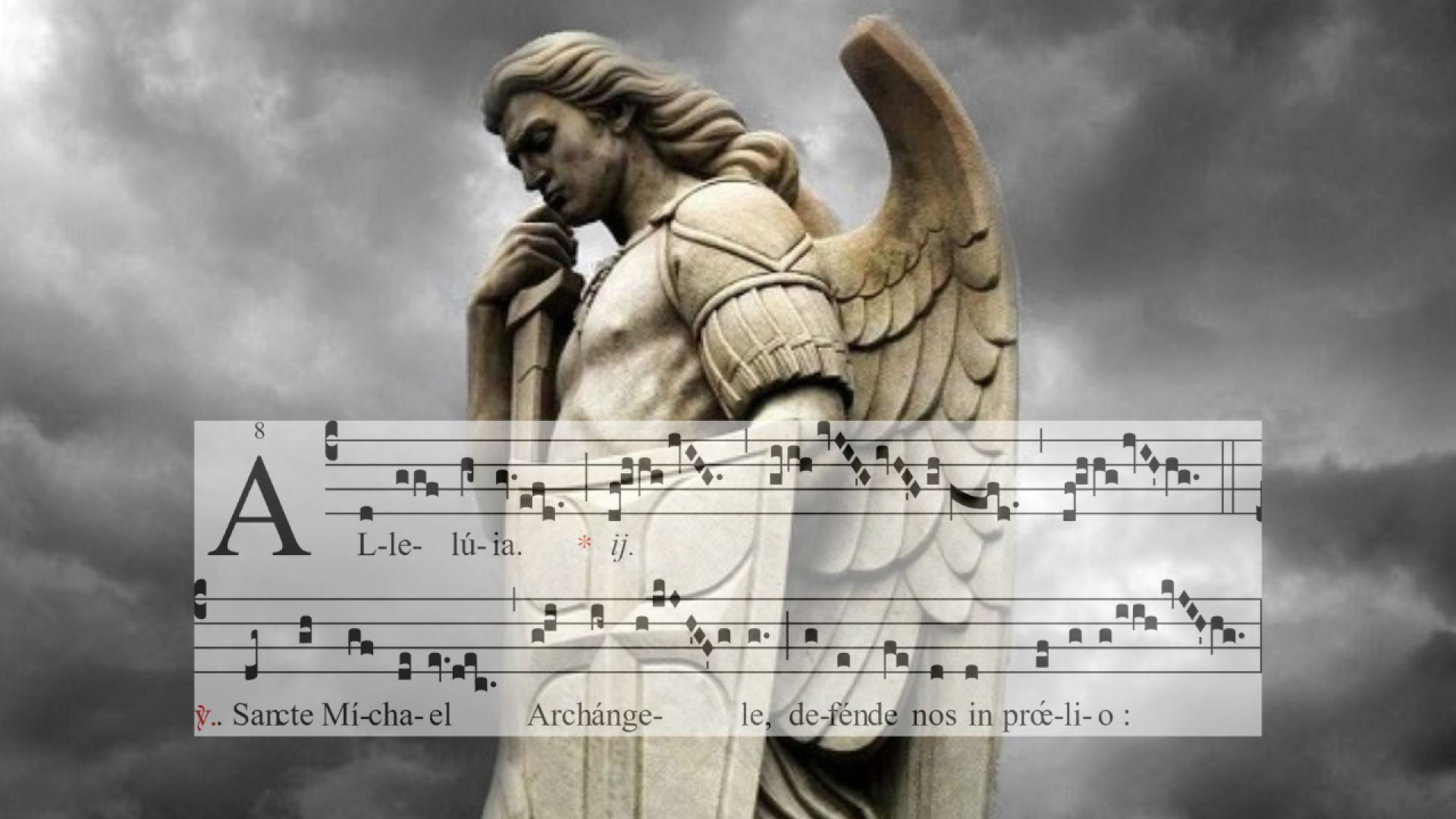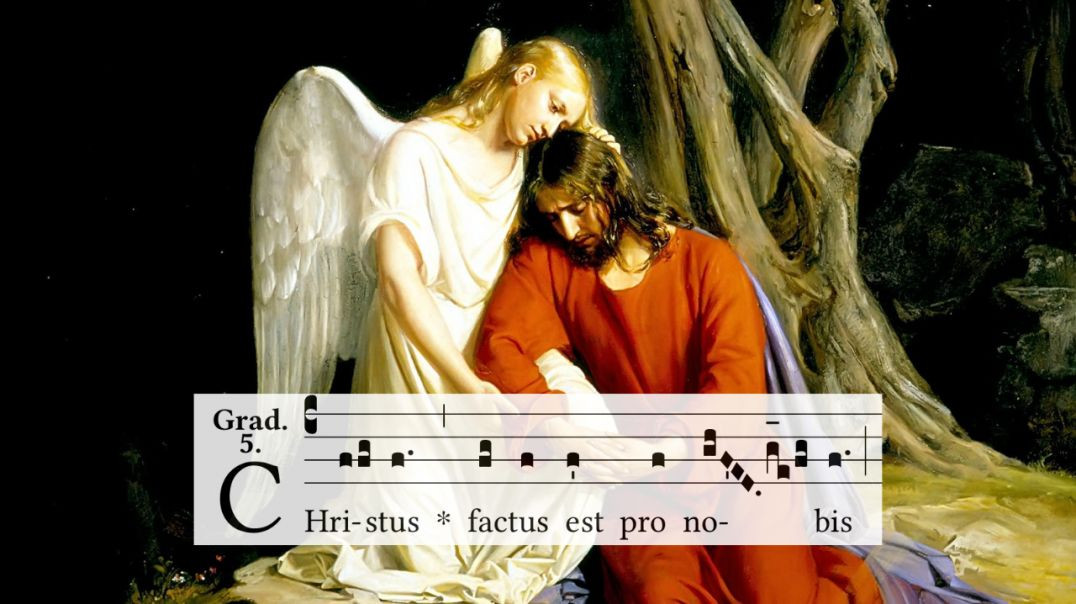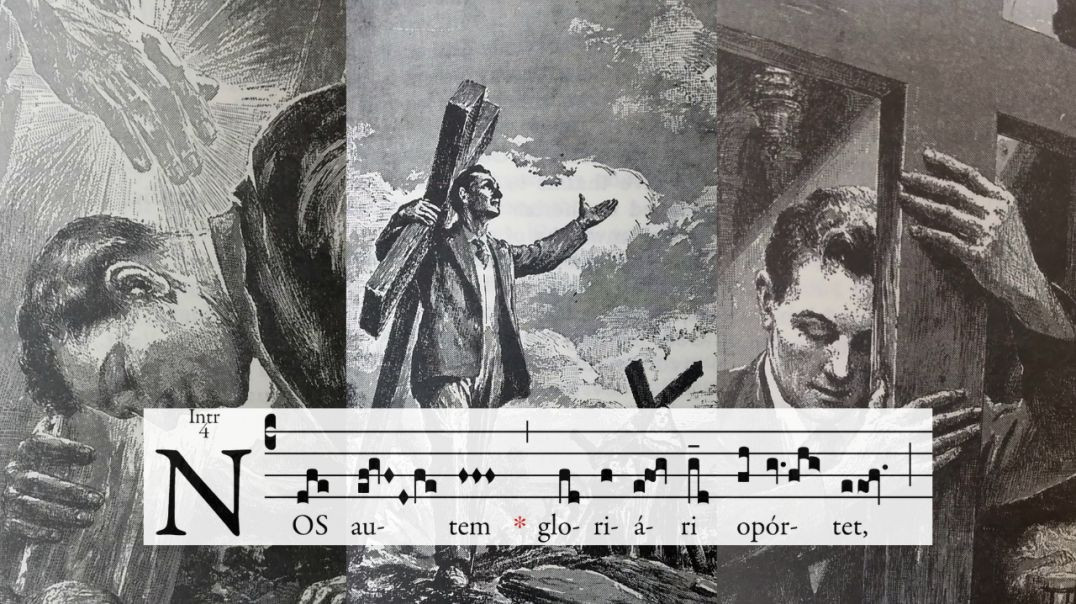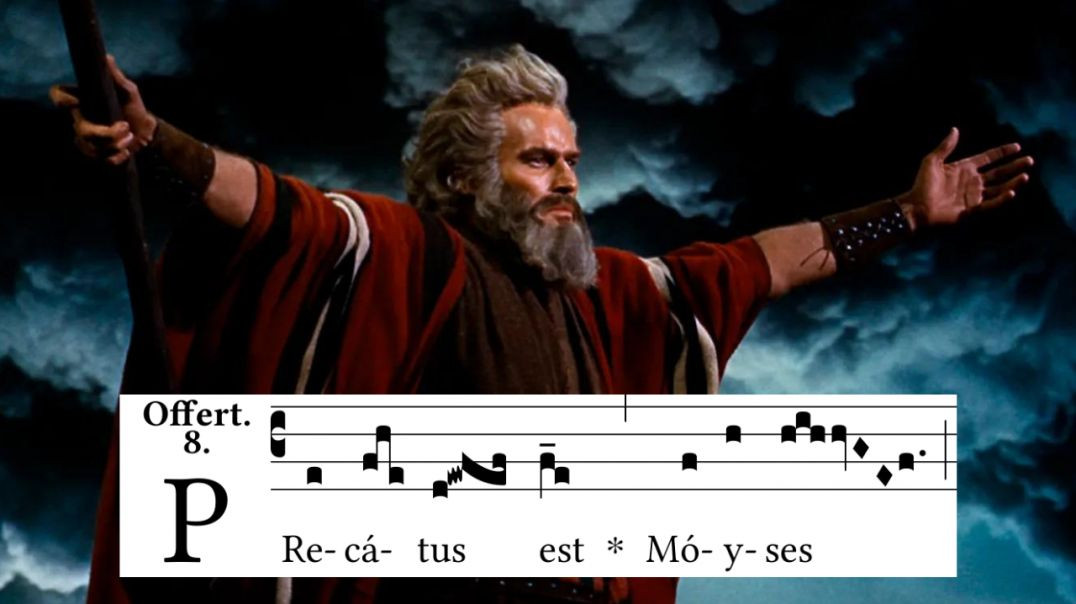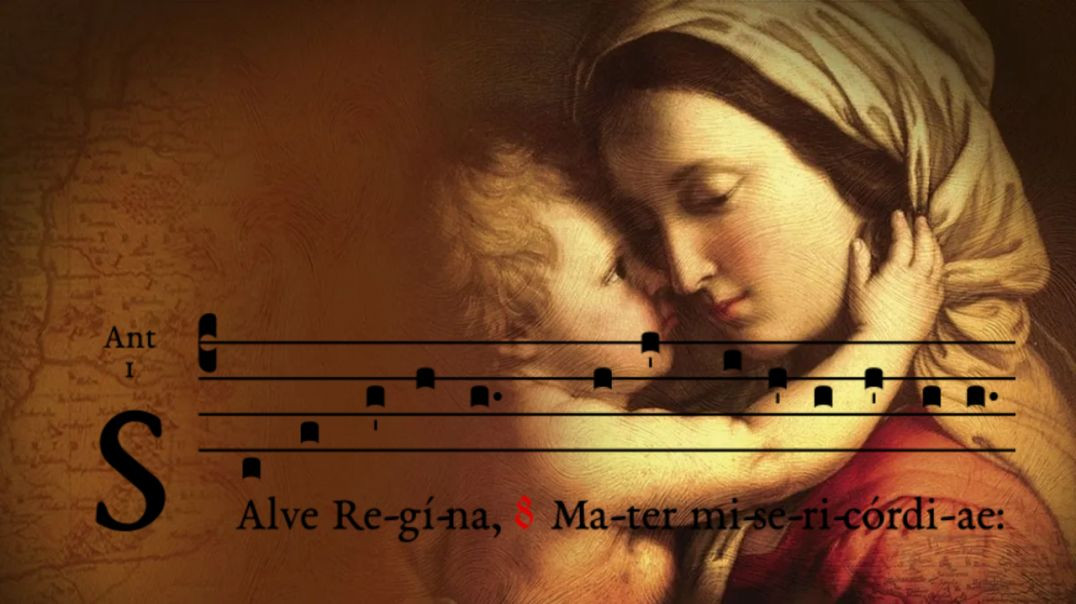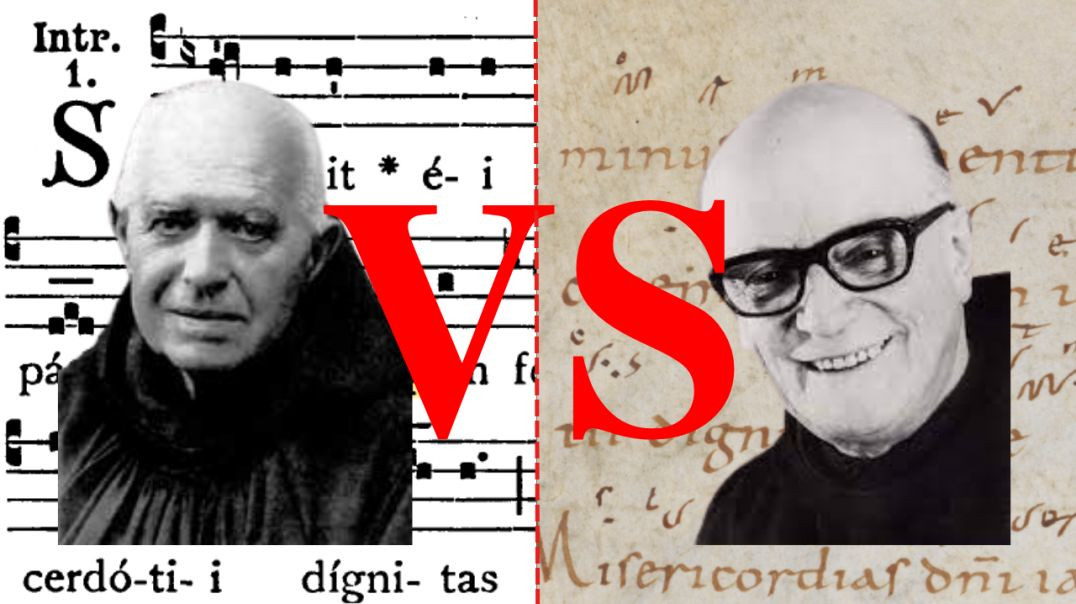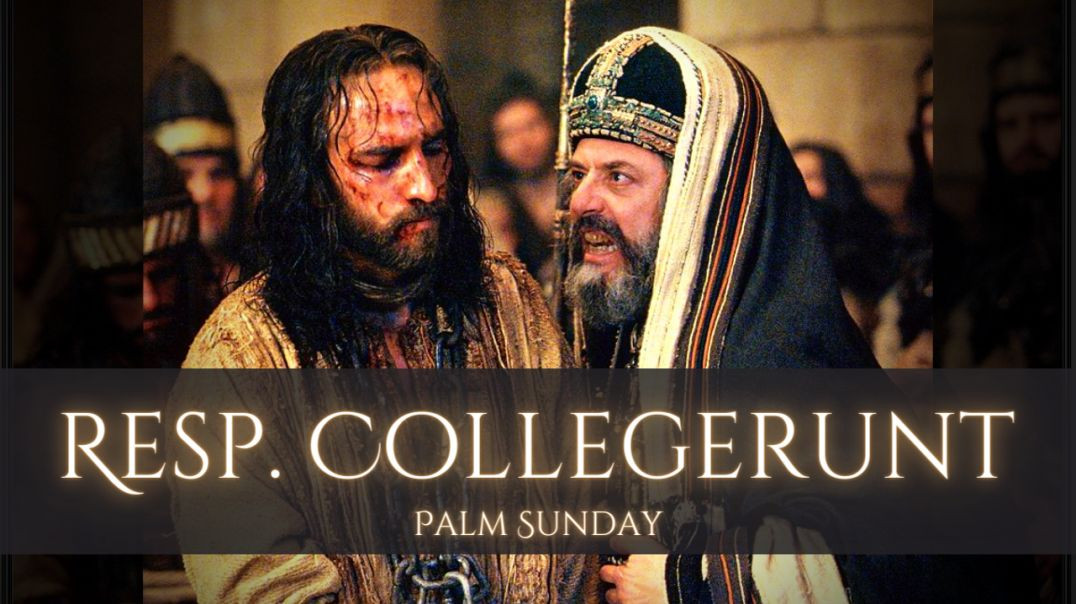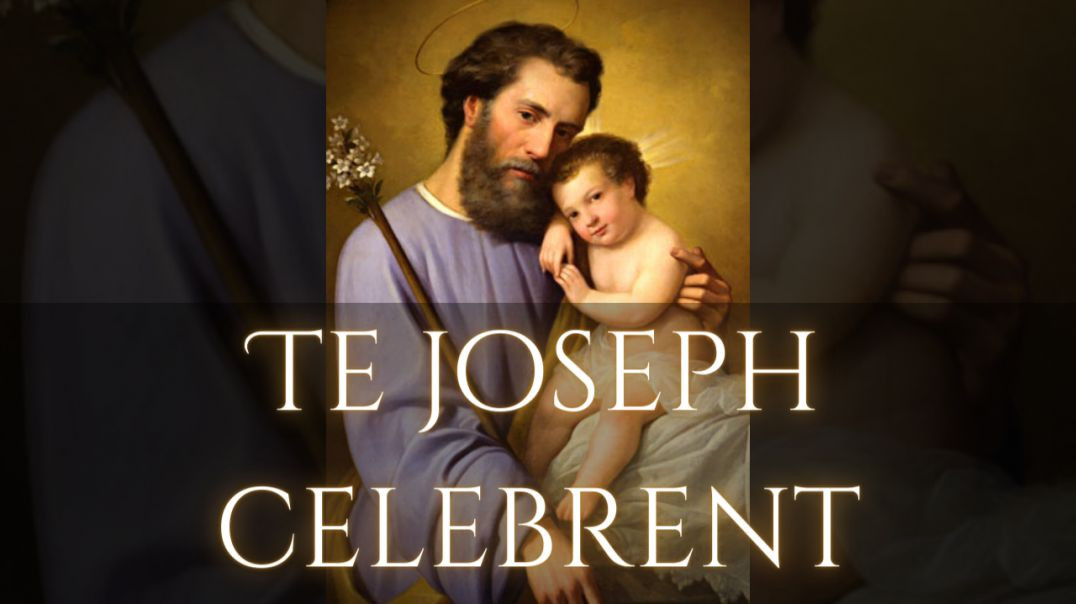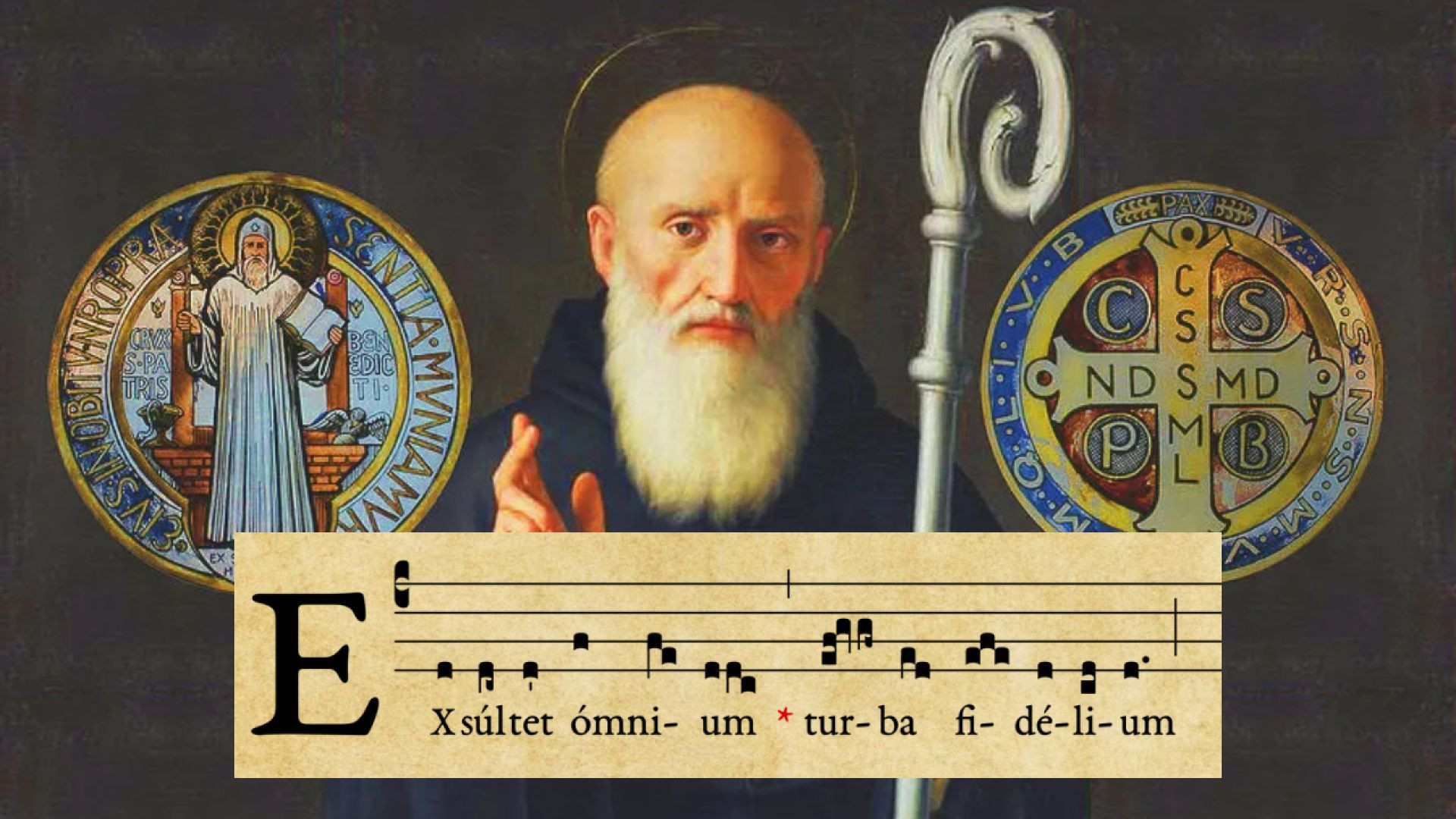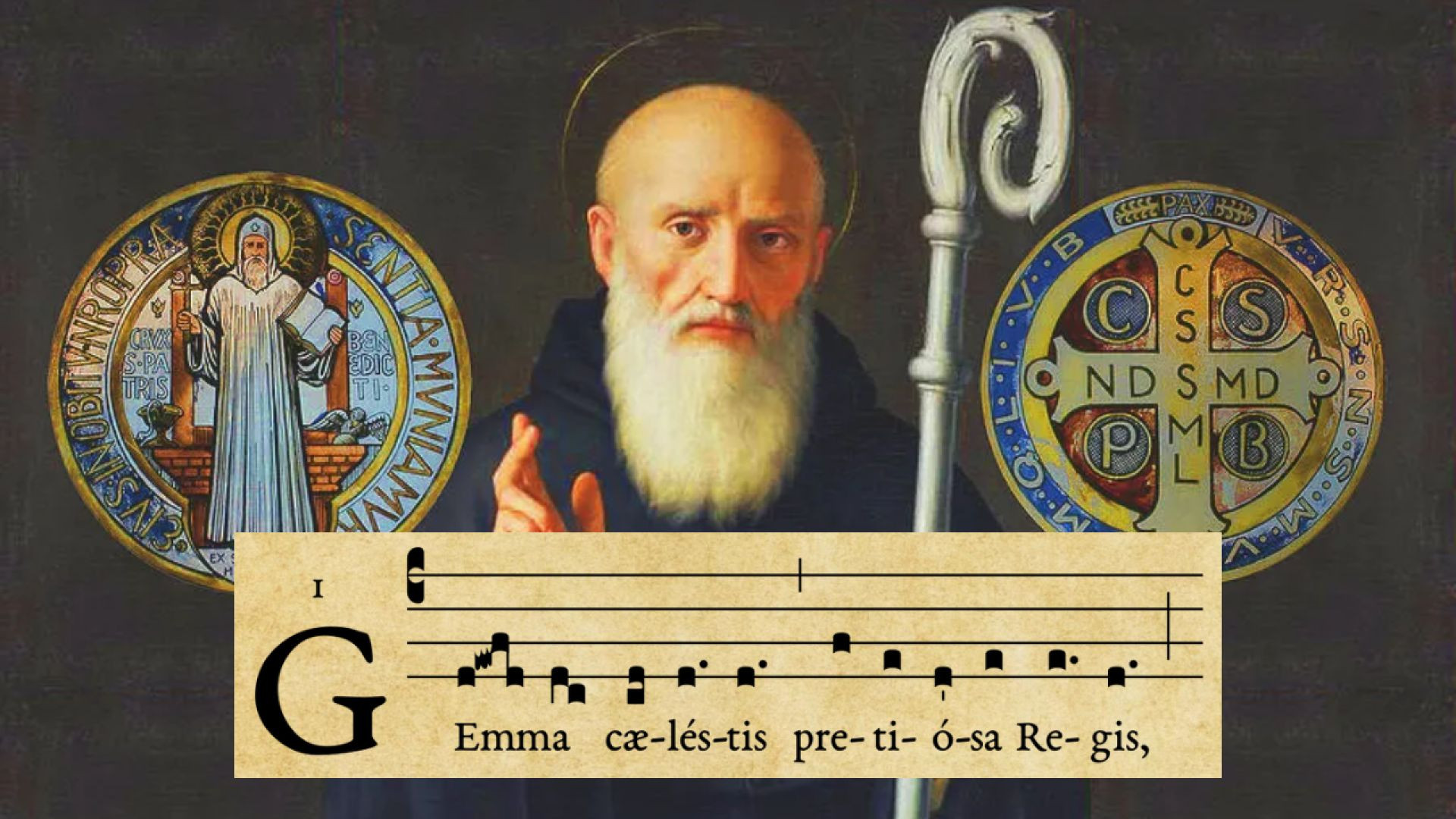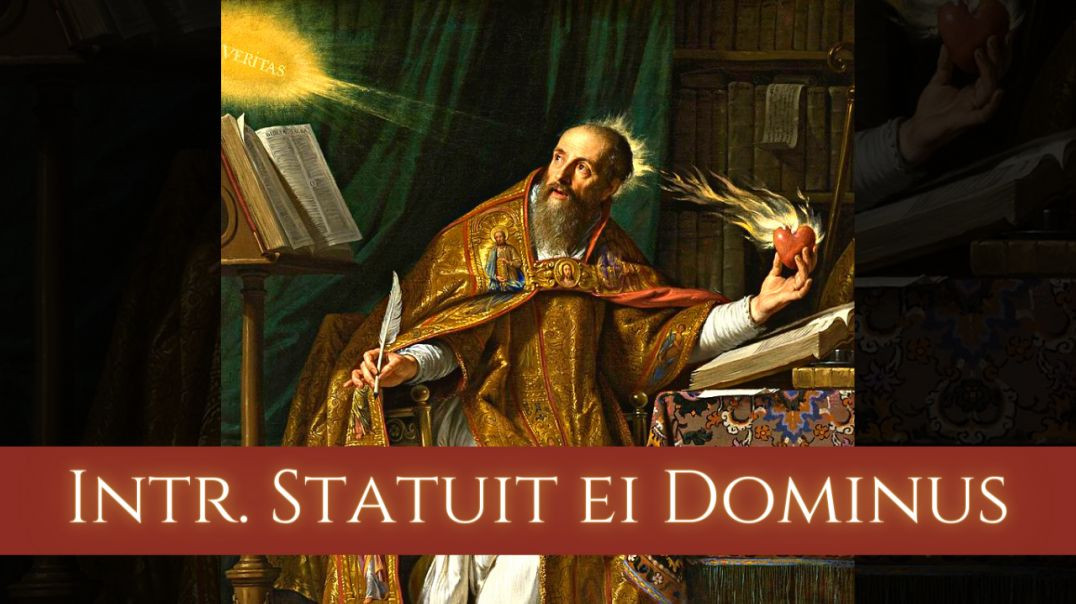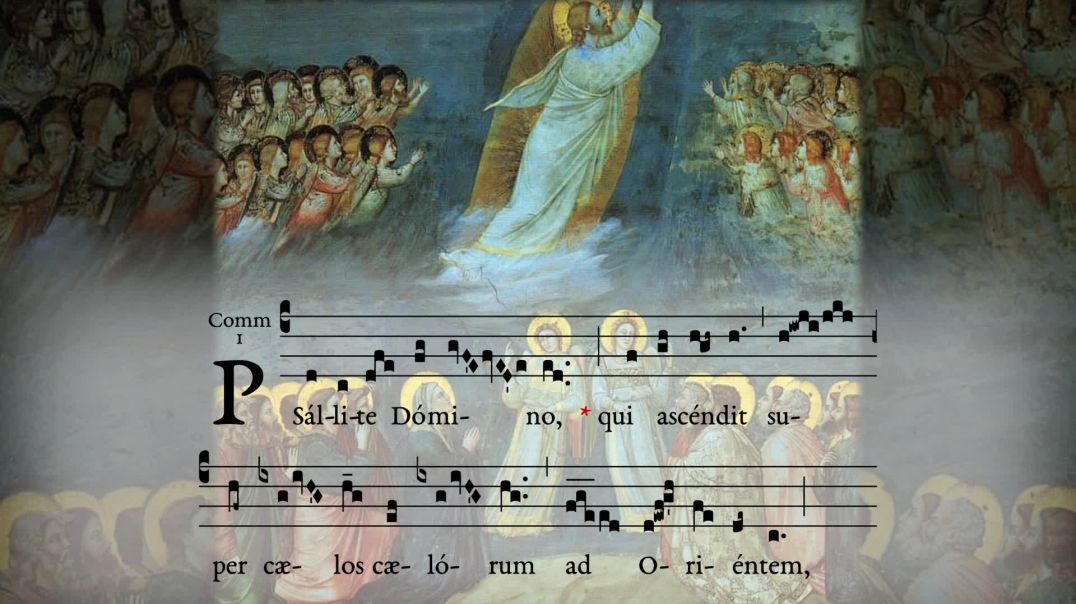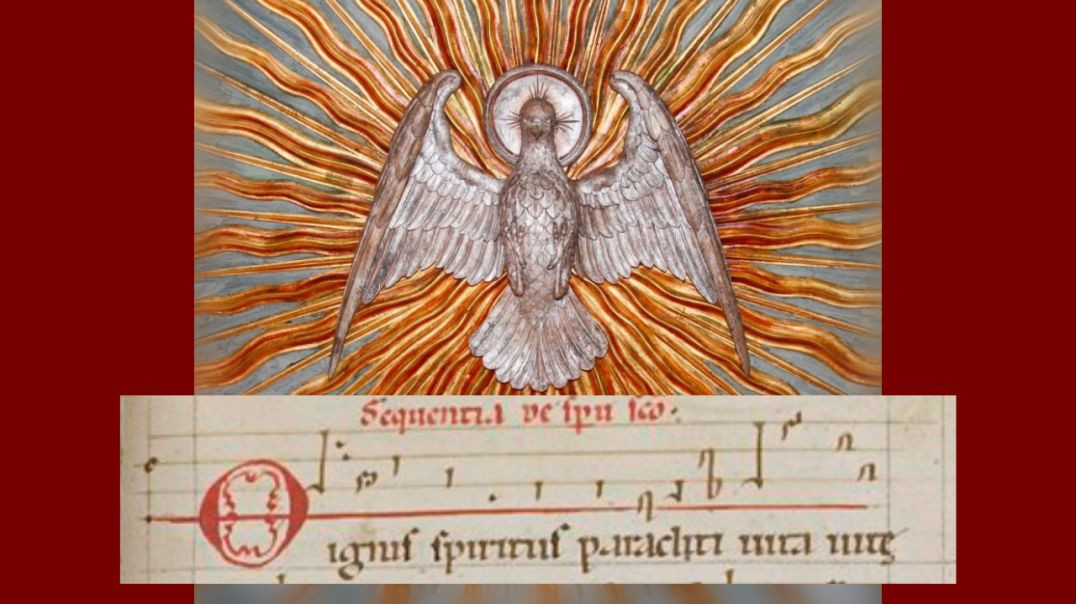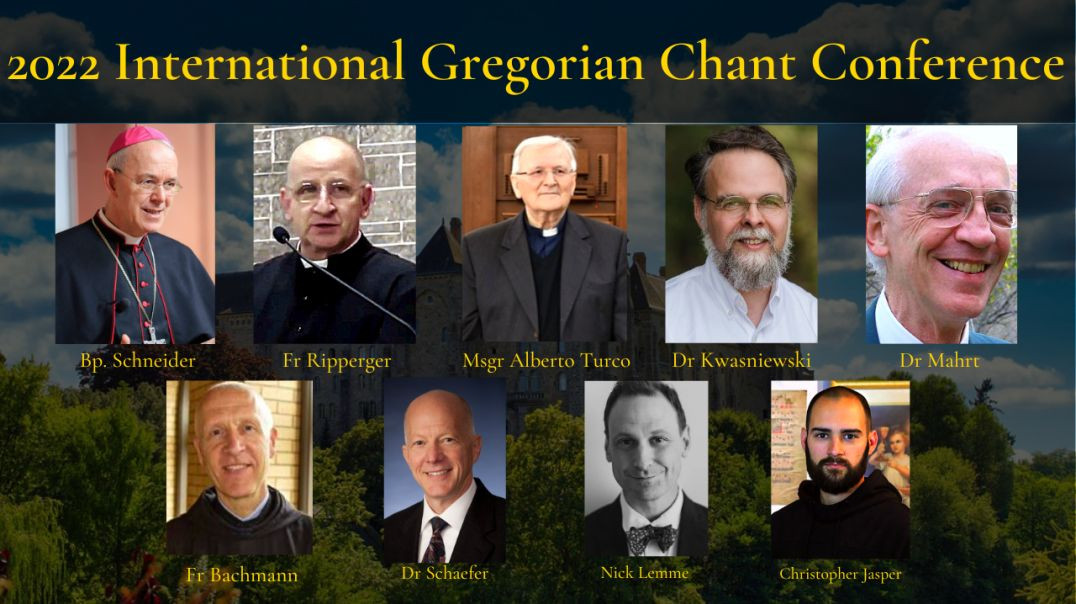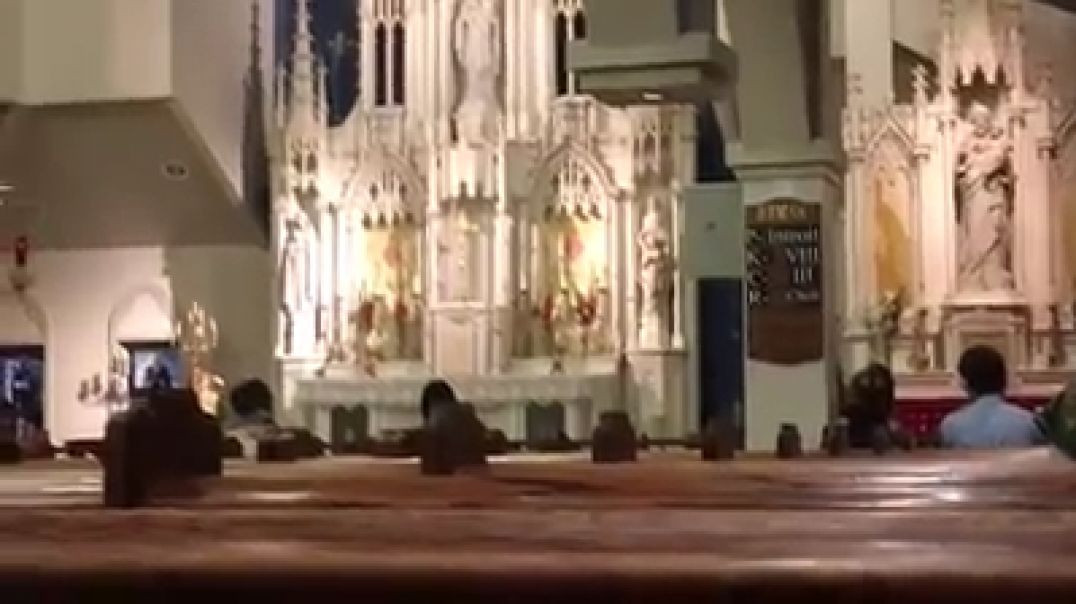Music
Sub Category
Join me and my good friend, Alberto Diaz-Blanco (director of Neumz) as he presents his spiritual commentary on the Introit for Easter Sunday, "Resurrexi et adhuc tecum sum" followed by a conversation about Gregorian Chant in general.
Learn more about Neumz at: https://www.Neumz.com
Download this song at: https://www.GregorianChantAcademy.com
Sign up for an online Chant Course at: https://www.GregorianChantAcademy.com/courses
Give a tip or become a monthly supporter at: https://www.GregorianChantAcademy.com/give
Special Thanks to my top Patreon and Coffee supporters:
Sergio Ubach, Maurisa Mayerle, Mary Catherine Maxian, Andy Mozisek, John Lyssikatos, Sheila McBride Mullaly, Alicja and Herve Blanquart, Collen Lunt, Ted Naff, Andrew Hattrup, Paul Hattrup, Noreen Cabili, Shirley Dunnells, Chavel Dixon
Did Jesus sing anything when He rose from the dead? If He did, what was it and what did it sound like? This may not be what He actually sang, but it is likely not too far from it either. To learn more about this chant, check out my episode with Neumz director, Alberto Diaz Blanco.
Download this song at: https://www.GregorianChantAcademy.com
Sign up for an online Chant Course at: https://www.GregorianChantAcademy.com/courses
Give a tip or become a monthly supporter at: https://www.GregorianChantAcademy.com/give
Special Thanks to my top Patreon and BMACoffee supporters:
Sergio Ubach, Maurisa Mayerle, Mary Catherine Maxian, Andy Mozisek, John Lyssikatos, Sheila McBride Mullaly, Alicja and Herve Blanquart, Collen Lunt, Ted Naff, Andrew Hattrup, Paul Hattrup, Noreen Cabili, Shirley Dunnells, Chavel Dixon
This version of the Divine Mercy Chaplet was inspired by the Othodox Thrice Holy Hymn (Trisagion). In this case, I used the Second Mode, brief for weekdays, a traditional Athonite Melody. To complete the chaplet, the "Eternal Father" and "For the Sake" sections are also inspired by Othodox chants. I'm sorry I forgot which ones I chose. But, they are appropriate to the lyrics for that section as similar words or concepts are covered by those chants. Here is the link for all of the Orthodox music https://stanthonysmonastery.or....g/pages/divine-litur
This was the first time I created an entire recording of the music and then added the lyrics afterward. I have no concept of music production like this, so the whole project took longer than expected. But, I learned a ton for future projects.
Thank you so much for checking out my work. I pray that you receive innumerable graces for taking the time to listen. Please give it a Thumbs Up, Subscribe and Share in your charity and to support more original Catholic music.
This is the simple tone version of the Regina Caeli, which is traditionally sung at the end of Compline (and Mass), the night prayer of the Church, from Compline of Holy Saturday until None of the Saturday within octave of Pentecost. It also typically replaces the Angelus which is prayed at morning, noon, and evening. It petitions Mary, as Queen of heaven, with her Son as King, to rejoice and pray for us. Whereas a few days before Easter she was the Lady of Sorrows, now we proclaim to her to rejoice, for Christ is Risen! As Christ chose to come to us through Her, He has also chosen for us to go to Him through her as well. The composer of the chant is anonymous, but the earliest record of the melody (the solemn form) dates back to an Antiphonary of the 12th century, held in St Peter's Basilica in Rome. According to legend, during the great plague of the 6th century, while Pope St Gregory the Great was leading a procession through the streets of Rome, there was heard angels singing the first three lines of this text, to which, St Gregory added the fourth. After this, he saw an angel on top of what is now Castel Sant'Angelo sheathing his sword, signifying the end of the plague. The historical veracity of this story is unknown.
Download this song at: https://www.GregorianChantAcademy.com/
Sign up for an online Chant Course at: https://www.GregorianChantAcademy.com/courses
Give a tip or become a monthly supporter at: https://www.GregorianChantAcademy.com/give
Special Thanks to my top Patreon and Coffee supporters:
Sergio Ubach, Maurisa Mayerle, Mary Catherine Maxian, Andy Mozisek, John Lyssikatos, Sheila McBride Mullaly, Alicja and Herve Blanquart, Collen Lunt, Ted Naff, Andrew Hattrup, Paul Hattrup, Noreen Cabili, Shirley Dunnells, Chavel Dixon
The Exsultet is the beautiful chant sung by the deacon at the Easter Vigil on Holy Saturday. After having blessed the fire and lighted the triple candle outside, the clergy and faithful process into the church, all in darkness, where the paschal candle is lit. Then, the Exsultet is sung... by candle light. Granted, there would not be any harmonic drones like in this recording; I have added that simply for esthetics since it is a recording, not the actual liturgy. Traditionally, prior to the liturgical changes of 1955, the mass of Holy Saturday (aka Easter Vigil) was not celebrated at night, but in the morning (just like the Vigil masses of Pentecost, Christmas and Assumption) as it is the mass of Holy Saturday, NOT the first mass of Easter Sunday. It is a mass in anticipation of the Resurrection. Therefore, in order to make the church dark, the windows, like the statues and sacred images, were also veiled. After the Exsultet was finished, the veils on the windows were removed, letting the light pour in and fill the church.
English translation:
"Let the angelic choirs of Heaven now rejoice; let the divine Mysteries rejoice; and let the trumpet of salvation sound forth the victory of so great a King. Let the earth also rejoice, made radiant by such splendor; and, enlightened with the brightness of the eternal King, let it know that the darkness of the whole world is scattered. Let our mother the Church also rejoice, adorned with the brightness of so great a light; and let this temple resound with the loud acclamations of the people. Wherefore I beseech you, most beloved brethren, who are here present in the wondrous brightness of this holy light, to invoke with me the mercy of almighty God. That He who has vouchsafed to admit me among the Levites, without any merits of mine, would pour forth the brightness of His light upon me, and enable me to perfect the praise of this wax candle. Through our Lord Jesus Christ His Son, Who with Him and the Holy Ghost liveth and reigneth one God for ever and ever. R. Amen."
Download this song at: https://www.GregorianChantAcademy.com/
Sign up for an online Chant Course at: https://www.GregorianChantAcademy.com/courses
Give a tip or become a monthly supporter at: https://www.GregorianChantAcademy.com/give
Special Thanks to my top Patreon and Coffee supporters:
Sergio Ubach, Maurisa Mayerle, Mary Catherine Maxian, Andy Mozisek, John Lyssikatos, Sheila McBride Mullaly, Alicja and Herve Blanquart, Collen Lunt, Ted Naff, Andrew Hattrup, Paul Hattrup, Noreen Cabili, Shirley Dunnells, Chavel Dixon
During the Triduum (Holy Thurs, Good Friday, Holy Saturday), the offices of Matins and Lauds are combined into what is known as "Tenebrae", meaning "darkness". It takes this name because it is traditionally prayed early in the morning - or the night before - in darkness, by candle light, and also because of the 5th Responsory on Good Friday whose text begins with "Tenebrae factae sunt" (and there was darkness), speaking of death of our Saviour, Jesus Christ, on the holy cross. The melody for this particular Responsory is particularly famous for its beautiful expression: at the words "Jesus cried out in a loud voice" it ends on a FA, then the next phrase "My God, why hast Thou forsaken Me?" begins an interval of a 6th higher - an unusual and rare interval in Gregorian Chant - followed almost immediately by a leap up another 4th to the high SOL on the very words of Christ's crying out to the Father. Once this cry has finished, it then descends a tritone - another very unusual and rare interval in Gregorian Chant - to begin the next phrase, "And He bowed His head and gave up the spirit."
English translation:
There was darkness when the Jews crucified Jesus; and about the ninth hour (3pm) Jesus cried out in a loud voice: "My God, why hast Thou forsaken Me?" And he bowed His head and gave up the spirit.
V. Jesus cried out in a loud voice, "Father, into Thy hands I commend my spirit. And He bowed His head and gave up the spirit.
Download this song at: https://www.GregorianChantAcademy.com/
Sign up for an online Chant Course at: https://www.GregorianChantAcademy.com/courses
Give a tip or become a monthly supporter at: https://www.GregorianChantAcademy.com/give
Special Thanks to my top Patreon and Coffee supporters:
Sergio Ubach, Maurisa Mayerle, Mary Catherine Maxian, Andy Mozisek, John Lyssikatos, Sheila McBride Mullaly, Alicja and Herve Blanquart, Collen Lunt, Ted Naff, Andrew Hattrup, Paul Hattrup, Noreen Cabili, Shirley Dunnells, Chavel Dixon
The Lamentations of Jeremiah are sung during the liturgy of Tenebrae (divine office of Matins & Lauds) on Holy Thursday, Good Friday and Holy Saturday on simple, mournful tones. In addition to the standard tones provided, there are optional, more elaborate tones taken from various medieval Mozarabic manuscripts from Spain. This tone is taken from an 10th century codex known as the Codex Gothicus Legionensis from the basilica of San Isidoro in Leon, Spain. This is the second lesson read at Tenebrae of Holy Saturday.
These lamentations - like the Psalms - can be interpreted in a number of different ways.
1) Historical. It is a prophesy of the destruction of the Jews and Jerusalem for their innumerable evils, especially for their rejection of the Messiah and their Deicide.
2) Spiritual. Jeremiah is a "type" or "prefiguring" of Jesus, like Moses and many others. In that sense, the personal words/prayers of Jeremiah to God can be seen as Christ's words to the Father. And, in as much as we are baptized into Christ and have him dwelling in our souls by sanctifying grace, they can be our words to God also.
3) Spiritual. In as much as we willfully sin, we too are like the Jews, condemning Jesus to death, mocking Him, spitting on Him, crucifying Him. In this sense, the evils we read of concerning the Jews can also be applied to our own souls, broken and desolate with sin, until we repent and return to the Lord our God.
Lam 4:1-8
1 Aleph. How is the gold become dim, the finest colour is changed, the stones of the sanctuary are scattered in the top of every street?
2 Beth. The noble sons of Sion, and they that were clothed with the best gold: how are they esteemed as earthen vessels, the work of the potter's hands?
3 Ghimel. Even the sea monsters have drawn out the breast, they have given suck to their young: the daughter of my people is cruel, like the ostrich in the desert.
4 Daleth. The tongue of the sucking child hath stuck to the roof of his mouth for thirst: the little ones have asked for bread, and there was none to break it unto them.
5 He. They that were fed delicately have died in the streets; they that were brought up in scarlet have embraced the dung.
6 Vau. And the iniquity of the daughter of my people is made greater than the sin of Sodom, which was overthrown in a moment, and hands took nothing in her.
Jerusalem! Jerusalem! Return unto the Lord thy God.
Download this song at: https://www.GregorianChantAcademy.com/
Sign up for an online Chant Course at: https://www.GregorianChantAcademy.com/courses
Give a tip or become a monthly supporter at: https://www.GregorianChantAcademy.com/give
Special Thanks to my top Patreon and Coffee supporters:
Sergio Ubach, Maurisa Mayerle, Mary Catherine Maxian, Andy Mozisek, John Lyssikatos, Sheila McBride Mullaly, Alicja and Herve Blanquart, Collen Lunt, Ted Naff, Andrew Hattrup, Paul Hattrup, Noreen Cabili, Shirley Dunnells, Chavel Dixon
The Lamentations of Jeremiah are sung during the liturgy of Tenebrae (divine office of Matins & Lauds) on Holy Thursday, Good Friday and Holy Saturday on simple, mournful tones. In addition to the standard tones provided, there are optional, more elaborate tones taken from various medieval Mozarabic manuscripts from Spain. This tone is taken from an 11th century codex from Silos, Spain known as the "Missal of Silos." This is the first lesson read at Tenebrae of Holy Thursday.
These lamentations - like the Psalms - can be interpreted in a number of different ways.
1) Historical. It is a prophesy of the destruction of the Jews and Jerusalem for their innumerable evils, especially for their rejection of the Messiah and their Deicide.
2) Spiritual. Jeremiah is a "type" or "prefiguring" of Jesus, like Moses and many others. In that sense, the personal words/prayers of Jeremiah to God can be seen as Christ's words to the Father. And, in as much as we are baptized into Christ and have him dwelling in our souls by sanctifying grace, they can be our words to God also.
3) Spiritual. In as much as we willfully sin, we too are like the Jews, condemning Jesus to death, mocking Him, spitting on Him, crucifying Him. In this sense, the evils we read of concerning the Jews can also be applied to our own souls, broken and desolate with sin, until we repent and return to the Lord our God.
English Translation:
The lamentation of the prophet Jeremiah begins.
Lam 1:1-5
1 Aleph. How doth the city sit solitary that was full of people! how is the mistress of the Gentiles become as a widow: the princes of provinces made tributary!
2 Beth. Weeping she hath wept in the night, and her tears are on her cheeks: there is none to comfort her among all them that were dear to her: all her friends have despised her, and are become her enemies.
3 Ghimel. Juda hath removed her dwelling place because of her affliction, and the greatness of her bondage: she hath dwelt among the nations, and she hath found no rest: all her persecutors have taken her in the midst of straits.
4 Daleth. The ways of Sion mourn, because there are none that come to the solemn feast: all her gates are broken down: her priests sigh: her virgins are in affliction, and she is oppressed with bitterness.
5 He. Her adversaries are become her lords, her enemies are enriched: because the Lord hath spoken against her for the multitude of her iniquities: her children are led into captivity: before the face of the oppressor.
Jerusalem, Jerusalem, return to the Lord thy God.
Download this song at: https://www.GregorianChantAcademy.com/
Sign up for an online Chant Course at: https://www.GregorianChantAcademy.com/courses
Give a tip or become a monthly supporter at: https://www.GregorianChantAcademy.com/give
Special Thanks to my top Patreon and Coffee supporters:
Sergio Ubach, Maurisa Mayerle, Mary Catherine Maxian, Andy Mozisek, John Lyssikatos, Sheila McBride Mullaly, Alicja and Herve Blanquart, Collen Lunt, Ted Naff, Andrew Hattrup, Paul Hattrup, Noreen Cabili, Shirley Dunnells, Chavel Dixon
Perhaps the most beautiful Gregorian chant hymn of Lent, Vexilla Regis is sung during Passiontide and Holy Week and also on the Feast of the Exaltation of the Holy Cross. I had the privilege of singing and recording this hymn with the schola from the Seminary of the Franciscan Friars of the Immaculate in Italy just weeks before the Vatican closed their thriving Seminary in 2013. This chant, and several others, can be found on my album Excitabo Auroram: https://fathermaxmusic.com/alb....um/1455516/excitabo-
[The album cover should say Ps. 56:9, not 65:1]
The Lamentations of Jeremiah are sung during the liturgy of Tenebrae (divine office of Matins & Lauds) on Holy Thursday, Good Friday and Holy Saturday on simple, mournful tones. In addition to the standard tones provided, there are optional, more elaborate tones taken from various medieval Mozarabic manuscripts from Spain. This is the third lesson reading on Good Friday and the tone is taken from an 10th century codex from Leon, Spain known as the "Codex Biblicus Leonensis."
These lamentations - like the Psalms - can be interpreted in a number of different ways.
1) Historical. It is a prophesy of the destruction of the Jews and Jerusalem for their innumerable evils, especially for their rejection of the Messiah and their Deicide.
2) Spiritual. Jeremiah is a "type" or "prefiguring" of Jesus, like Moses and many others. In that sense, the personal words/prayers of Jeremiah to God can be seen as Christ's words to the Father. And, in as much as we are baptized into Christ and have him dwelling in our souls by sanctifying grace, they can be our words to God also.
3) Spiritual. In as much as we willfully sin, we too are like the Jews, condemning Jesus to death, mocking Him, spitting on Him, crucifying Him. In this sense, the evils we read of concerning the Jews can also be applied to our own souls, broken and desolate with sin, until we repent and return to the Lord our God.
English translation:
(Lamentations 3:1-9)
1 Aleph. I am the man that see my poverty by the rod of his indignation.
2 Aleph. He hath led me, and brought me into darkness, and not into light.
3 Aleph. Only against me he hath turned, and turned again his hand all the day.
4 Beth. My skin and my flesh he hath made old, he hath broken my bones.
5 Beth. He hath built round about me, and he hath compassed me with gall and labour.
6 Beth. He hath set me in dark places as those that are dead for ever.
7 Ghimel. He hath built against me round about, that I may not get out: he hath made my fetters heavy.
8 Ghimel. Yea, and when I cry, and entreat, he hath shut out my prayer.
9 Ghimel. He hath shut up my ways with square stones, he hath turned my paths upside down.
Jerusalem! Jerusalem! Return unto the Lord thy God.
Download this song: https://www.GregorianChantAcademy.com/
Online Chant Master-Course: https://www.GregorianChantAcademy.com/courses
To help support the work of this Academy: https://www.GregorianChantAcademy.com/give
The Lamentations of Jeremiah are sung during the liturgy of Tenebrae (divine office of Matins & Lauds) on Holy Thursday, Good Friday and Holy Saturday on simple, mournful tones. In addition to the standard tones provided, there are optional, more elaborate tones taken from various medieval Mozarabic manuscripts from Spain. This tone is taken from an 11th century codex from Silos, Spain known as the "Missal of Silos."
These lamentations - like the Psalms - can be interpreted in a number of different ways.
1) Historical. It is a prophesy of the destruction of the Jews and Jerusalem for their innumerable evils, especially for their rejection of the Messiah and their Deicide.
2) Spiritual. Jeremiah is a "type" or "prefiguring" of Jesus, like Moses and many others. In that sense, the personal words/prayers of Jeremiah to God can be seen as Christ's words to the Father. And, in as much as we are baptized into Christ and have him dwelling in our souls by sanctifying grace, they can be our words to God also.
3) Spiritual. In as much as we willfully sin, we too are like the Jews, condemning Jesus to death, mocking Him, spitting on Him, crucifying Him. In this sense, the evils we read of concerning the Jews can also be applied to our own souls, broken and desolate with sin, until we repent and return to the Lord our God.
English translation:
Lesson from the book of Lamentations
Lam 2:8-11
8 Heth. The Lord hath purposed to destroy the wall of the daughter of Sion: he hath stretched out his line, and hath not withdrawn his hand from destroying: and the bulwark hath mourned, and the wall hath been destroyed together.
9 Teth. Her gates are sunk into the ground: he hath destroyed, and broken her bars: her king and her princes are among the Gentiles: the law is no more, and her prophets have found no vision from the Lord.
10 Jod. The ancients of the daughter of Sion sit upon the ground, they have held their peace: they have sprinkled their heads with dust, they are girded with haircloth, the virgins of Jerusalem hang down their heads to the ground.
11 Caph. My eyes have failed with weeping, my bowels are troubled: my liver is poured out upon the earth, for the destruction of the daughter of my people, when the children, and the sucklings, fainted away in the streets of the city.
Jerusalem! Jerusalem! Return unto the Lord thy God.
Download this song: https://www.GregorianChantAcademy.com/
Online Chant Master-Course: https://www.GregorianChantAcademy.com/courses
To help support the work of this Academy: https://www.GregorianChantAcademy.com/give
The Lamentations of Jeremiah are sung during the liturgy of Tenebrae (divine office of Matins & Lauds) on Holy Thursday, Good Friday and Holy Saturday on simple, mournful tones. In addition to the standard tones provided, there are optional, more elaborate tones taken from various medieval Mozarabic manuscripts from Spain. This tone is taken from an 11th century codex from Silos, Spain known as the "Missal of Silos." This lesson, "Incipit Oratio Jeremiae Prophetae," is the third lamentation on Holy Saturday.
These lamentations - like the Psalms - can be interpreted in a number of different ways.
1) Historical. It is a prophesy of the destruction of the Jews and Jerusalem for their innumerable evils, especially for their rejection of the Messiah and their Deicide.
2) Spiritual. Jeremiah is a "type" or "prefiguring" of Jesus, like Moses and many others. In that sense, the personal words/prayers of Jeremiah to God can be seen as Christ's words to the Father. And, in as much as we are baptized into Christ and have him dwelling in our souls by sanctifying grace, they can be our words to God also.
3) Spiritual. In as much as we willfully sin, we too are like the Jews, condemning Jesus to death, mocking Him, spitting on Him, crucifying Him. In this sense, the evils we read of concerning the Jews can also be applied to our own souls, broken and desolate with sin, until we repent and return to the Lord our God.
English Translation:
Lam 5:1-11
"[Thus begins the prayer of Jeremiah the Prophet.]
1 Remember, O Lord, what is come upon us: consider and behold our reproach.
2 Our inheritance is turned to aliens: our houses to strangers.
3 We are become orphans without a father: our mothers are as widows.
4 We have drunk our water for money: we have bought our wood.
5 We were dragged by the necks, we were weary and no rest was given us.
6 We have given our hand to Egypt, and to the Assyrians, that we might be satisfied with bread.
7 Our fathers have sinned, and are not: and we have borne their iniquities.
8 Servants have ruled over us: there was none to redeem us out of their hand.
9 We fetched our bread at the peril of our lives, because of the sword in the desert.
10 Our skin was burnt as an oven, by reason of the violence of the famine.
11 They oppressed the women in Sion, and the virgins in the cities of Juda.
Jerusalem! Jerusalem! Return unto the Lord thy God."
Download this song: https://www.GregorianChantAcademy.com/
Online Chant Courses: https://www.GregorianChantAcademy.com/courses
To help support the work of this Academy: https://www.GregorianChantAcademy.com/give
The Gregorian Chant Academy and the team behind the Neumz app have partnered to present you with some beautiful spiritual commentaries on various chants by the director of the Neumz app, Alberto Diaz-Blanco. Senor Blanco and I both believe that a spiritual/liturgical understanding of the chants is of primary importance. Gregorian Chant is, after all, first and foremost prayer. Therefore, a proper musical interpretation must be firmly rooted in, influenced and guided by a deep spiritual and liturgical understanding of these chants, and we must strive to live our lives in accordance and harmony with them, i.e. truly live our Faith.
Learn more about the Neumz app: https://www.neumz.com
Download this song at: https://www.GregorianChantAcademy.com/
Sign up for an online Chant Course at: https://www.GregorianChantAcademy.com/courses
Give a tip or become a monthly supporter at: https://www.GregorianChantAcademy.com/give
Special Thanks to my top Patreon and Coffee supporters: Sergio Ubach, Maurisa Mayerle, Mary Catherine Maxian, Andy Mozisek, John Lyssikatos, Sheila McBride Mullaly, Alicja and Herve Blanquart, Collen Lunt, Ted Naff, Andrew Hattrup, Paul Hattrup, Noreen Cabili, Shirley Dunnells, Chavel Dixon
"Laetare Jerusalem" is the introit (entrance) chant for the 4th Sunday of Lent which, like Gaudete Sunday in Advent, is a Sunday of rejoicing. The words "laetare" and "gaudete" in fact mean "rejoice"! In Advent, we are rejoicing because of proximity of the birth of our Savior; but here in Lent, we are rejoicing because of the proximity of the promise of our Savior, our salvation itself, by His death and resurrection. For a spiritual commentary on this chant, check out this video here: https://spiritustv.com/watch/b....eautiful-commentary-
Download this song at: https://www.GregorianChantAcademy.com/
Sign up for an online Chant Course at: https://www.GregorianChantAcademy.com/courses
Give a tip or become a monthly supporter at: https://www.GregorianChantAcademy.com/give
Special Thanks to my top Patreon and Coffee supporters: Sergio Ubach, Maurisa Mayerle, Mary Catherine Maxian, Andy Mozisek, John Lyssikatos, Sheila McBride Mullaly, Alicja and Herve Blanquart, Collen Lunt, Ted Naff, Andrew Hattrup, Paul Hattrup, Noreen Cabili, Shirley Dunnells, Chavel Dixon
To the best of my knowledge, the melody of this chant, "Attende Domine", comes from a 17th century codex while the text comes from a 10th century Mozarabic codex. It speaks of the penitent's admission of his sin and guilt, without ever giving way to depression or despair, wonderfully captured by the joyful yet peaceful melody. The soul, full of trust, confesses its sins and calmly places itself in hands of its Redeemer, knowing, without a doubt, that He will forgive those who are truly sorry for their sins.
Download this song at: https://www.GregorianChantAcademy.com/
Sign up for an online Chant Course at: https://www.GregorianChantAcademy.com/courses
Give a tip or become a monthly supporter at: https://www.GregorianChantAcademy.com/give
Special Thanks to my top Patreon and Coffee supporters:
Sergio Ubach, Maurisa Mayerle, Mary Catherine Maxian, Andy Mozisek, John Lyssikatos, Sheila McBride Mullaly, Alicja and Herve Blanquart, Collen Lunt, Ted Naff, Andrew Hattrup, Paul Hattrup, Noreen Cabili, Shirley Dunnells, Chavel Dixon
From NewAdvent.org: The Ave Regina Caelorum is one of four Antiphons of the Blessed Virgin sung in the Divine Office in turn throughout the year, and is assigned from Compline of February 2nd to Compline of Holy Wednesday. It recalls the part Mary had in the drama of the reopening of Heaven to men and shows her as reigning there Queen of Angels. Its date of composition is uncertain, but... [it's earliest appearance is] found in the St. Alban's Book of the twelfth century. ... Bernard [Le Breviaire (Paris, 1887), II, 454 sqq.] says it was introduced into the Divine Office by Clement VI in the fourteenth century.
Download this song at: https://www.GregorianChantAcademy.com/
Sign up for an online Chant Course at: https://www.GregorianChantAcademy.com/courses
Give a tip or become a monthly supporter at: https://www.GregorianChantAcademy.com/give
Special Thanks to my top Patreon and Coffee supporters:
Sergio Ubach, Maurisa Mayerle, Mary Catherine Maxian, Andy Mozisek, John Lyssikatos, Sheila McBride Mullaly, Alicja and Herve Blanquart, Collen Lunt, Ted Naff, Andrew Hattrup, Paul Hattrup, Noreen Cabili, Shirley Dunnells, Chavel Dixon
The Gregorian Chant Academy is 2 years young! Join me as I share some stories and data from the previous years, getting your feedback, announcing new features and events, and setting a new goal!
If you could spare just a few minutes, I would greatly appreciate it if you could complete this short questionnaire. (Your answers are completely anonymous) It will help me understand how to better serve you and the Church. Thank you and God bless! https://forms.gle/C3569mbU5PZfhvVV9
Download my chant recordings: https://www.GregorianChantAcademy.com/
Online Chant Courses: https://www.GregorianChantAcademy.com/courses
Give a tip or become a monthly supporter at: https://www.GregorianChantAcademy.com/give
Special Thanks to my top Patreon and Coffee supporters:
Sergio Ubach, Maurisa Mayerle, Mary Catherine Maxian, Andy Mozisek, John Lyssikatos, Sheila McBride Mullaly, Alicja and Herve Blanquart, Collen Lunt, Ted Naff, Andrew Hattrup, Paul Hattrup, Noreen Cabili, Shirley Dunnells, Chavel Dixon
"Alma Redemptoris Mater" is one the four Marian "antiphons" sung during the four liturgical seasons. The antiphons are traditionally sung after Compline (and sometimes after Mass), with the "Alma" being sung from the 1st Sunday of Advent until Vespers of The Purification of Mary, February 2.
Hermannus Contractus is believed to have composed this in the 11th century based on the writings of Saints Fulgentius, Epiphanius, and Irenaeus of Lyon, referring to the Blessed Virgin as "Star of the Sea" and "Gate of heaven," upon whom all nature stared in wonder: a virgin mother! giving birth to her Creator!
Download this song at: https://www.GregorianChantAcademy.com/
Online Chant Master-Course: https://www.GregorianChantAcademy.com/courses
Give a tip or become a monthly supporter at: https://www.GregorianChantAcademy.com/give
Special Thanks to my top Patreon and Coffee supporters:
Maurisa Mayerle, Mary Catherine Maxian, Andy Mozisek, John Lyssikatos, Sheila McBride Mullaly, Alicja and Herve Blanquart, Collen Lunt, Ted Naff, Andrew Hattrup, Paul Hattrup, Noreen Cabili, Shirley Dunnells, Chavel Dixon
This is the devotional chant "Rorate Caeli," different and separate from the Introit chant of the same title, but obviously related. According to a Wikipedia article, "In the seventeenth century, [the] Rorate Caeli was arranged into a hymn combining the traditional text with other scriptural passages used in the liturgy for Advent. The earliest known version is in the Oratorian Officia Propria (1673); it also appears in French diocesan rites, such as the Rouen Processional of 1729 and 1763. ...Under the heading, "Prayer of the Churches of France during Advent", Dom Guéranger [,the great restorer of the Abbey of Solesmes, in his multi-volume work "The Liturgical Year"] gives it as an antiphon to each of a series of prayers ("Ne irascaris ", "Peccavimus", "Vide Domine", "Consolamini") expressive of penitence, expectation, comfort, and furnishes the Latin text and an English rendering of the Prayer." When the text speaks of Sion and Jerusalem being desolate and destroyed, we can this as representative of our own souls, ruined by sin, but restored by penance and God's grace. The harmony in this is by my good friends @HarpaDeiMusic.
Download this song: https://www.GregorianChantAcademy.com/
Online Chant Master-Course: https://www.GregorianChantAcademy.com/courses
Give a tip or become a monthly support at Buy Me A Coffee: https://www.buymeacoffee.com/chantacademy
Special Thanks to my top Patreon and Coffee supporters:
Maurisa Mayerle
Mary Catherine Maxian
Andy Mozisek
John Lyssikatos
Sheila McBride Mullaly
Alicja and Herve Blanquart
Collen Lunt
Ted Naff
Andrew Hattrup
Paul Hattrup
Noreen Cabili
Shirley Dunnells
Chavel Dixon
I recorded 3 versions of the melody for the Introit "Populus Sion" from the 2nd Sunday in Advent: from the Graduale Romanum, Graduale Novum, and the Liber Gradualis. Here is what they sound like!
Download my Recordings: https://www.GregorianChantAcademy.com/
Online Chant Master-Course: https://www.GregorianChantAcademy.com/courses
Give a tip or become a member at Buy Me A Coffee: https://www.buymeacoffee.com/chantacademy
Special Thanks to my top Patreon and Coffee supporters:
Maurisa Mayerle
Mary Catherine Maxian
Andy Mozisek
John Lyssikatos
Sheila McBride Mullaly
Alicja and Herve Blanquart
Collen Lunt
Ted Naff
Andrew Hattrup
Paul Hattrup
Noreen Cabili
Shirley Dunnells
This is the Introit from the Mass for the Dead. The month of November is dedicated to the holy souls in Purgatory. Never forget to pray for them as they are unable to help themselves.
Special thanks to Jeremy Williams of Sentimental Impressions photography for filming this video: https://www.sentimentalimpression.com/
This video is especially dedicated to my dear friends Leo Heinen, his baby niece Emma Grant, both of whom died from tragic accidents only one year apart, and Emma's mother Sarah (Leo's sister) who died from cancer 3-1/2 years after Emma, after having given birth to her 8th child. RIP
Download this song: https://www.GregorianChantAcademy.com/
Online Chant Master-Course: https://www.GregorianChantAcademy.com/courses
Here is my own explanation of how I made the decisions on my version of the Gregorian Rosary. Not sure why the video color is so reddish and saturated... my settings must have been off a bit.
Download this song: https://www.GregorianChantAcademy.com/
Online Chant Master-Course: https://www.GregorianChantAcademy.com/courses
To help support the work of this Academy: https://www.Patreon.com/GregorianChantAcademy
Due to many requests over the past year, here is my own version of the "Gregorian Rosary." Instead of making a generic rosary for any and all mysteries, I have opted to use melodies which suitably represent each of the mysteries, beginning here with the Joyful mysteries. Next Lent, I plan on releasing the Sorrowful mysteries, followed by the Glorious in Eastertide. May God bless you and our Lady of the Rosary, pray for us! It is my hope that this may help others to pray the rosary more devoutly; to more easily meditate on the mysteries of the most holy rosary.
"Pray the Rosary every day in order to obtain peace for the World... So many souls go to hell because they have no one to pray for them." ~ Our Lady of Fatima, 1917
"“The Most Holy Virgin in these last times in which we live has given a new efficacy to the recitation of the Rosary to such an extent that there is no problem, no matter how difficult it is, whether temporal or above all spiritual, in the personal life of each one of us, of our families…that cannot be solved by the Rosary. There is no problem, I tell you, no matter how difficult it is, that we cannot resolve by the prayer of the Holy Rosary.” ~ Sr Lucia dos Santos of Fatima
"The Rosary is the weapon of our times." ~ St Padre Pio
"Give me an army praying the rosary and I will conquer the world." ~ Pope Pius IX
“One day, through the Rosary and the Scapular, Our Lady will save the world.” ~ St Dominic
Download this song: https://www.GregorianChantAcademy.com/
Online Chant Master-Course: https://www.GregorianChantAcademy.com/courses
To help support the work of this Academy: https://www.Patreon.com/GregorianChantAcademy
This is the Alleluia from the Mass celebrating the feast of St Michael the Archangel, September 29.
Download this song: https://www.GregorianChantAcademy.com/
Online Chant Master-Course: https://www.GregorianChantAcademy.com/courses
The text of this Gradual "Christus factus est" is taken from St Paul's letter to the Philippians 2: 8-9.
This chant is sung on both Holy Thursday and the feast of the Exaltation of the Holy Cross, Sept 14.
But the verses immediately preceding those found in the Gradual are also critically important for our instruction and are given here:
"1. If there be therefore any consolation in Christ, if any comfort of charity, if any society of the spirit, if any bowels of commiseration: 2 Fulfil ye my joy, that you be of one mind, having the same charity, being of one accord, agreeing in sentiment. 3 Let nothing be done through contention: neither by vain glory. But in humility, let each esteem others better than themselves: 4 Each one not considering the things that are his own, but those that are other men's. 5 For let this mind be in you, which was also in Christ Jesus: 6 Who being in the form of God, thought it not robbery to be equal with God: 7 But emptied himself, taking the form of a servant, being made in the likeness of men, and in habit found as a man. 8 He humbled himself, becoming obedient unto death, even to the death of the cross. 9 For which cause, God also hath exalted him and hath given him a name which is above all names: 10 That in the name of Jesus every knee should bow, of those that are in heaven, on earth, and under the earth: 11 And that every tongue should confess that the Lord Jesus Christ is in the glory of God the Father."
Download this song: https://www.GregorianChantAcademy.com/
2022 online International Chant Conference: https://www.GregorianChantAcademy.com/conference
Online Chant Master-Course: https://www.GregorianChantAcademy.com/courses
The text for the Introit "Nos autem gloriari" is based upon St Paul's letter to the Galations 6:14 ("But God forbid that I should glory, save in the cross of our Lord Jesus Christ; by whom the world is crucified to me, and I to the world"), while the Psalm verse is taken from Ps. 66:2, "May God have mercy on us, and bless us: may he cause the light of his countenance to shine upon us, and may he have mercy on us." This chant is sung on both Holy Thursday and the feast of the Exaltation of the Holy Cross, September 14.
As Jesus Christ teaches us, by word and example, "If any man will come after me, let him deny himself, and take up his cross daily, and follow me." ~ Matt 16:24 and Mark 8:34
Images are taken from the "Imitation of Christ."
Download this song: https://www.GregorianChantAcademy.com/
2022 online International Chant Conference: https://www.GregorianChantAcademy.com/conference
Online Chant Master-Course: https://www.GregorianChantAcademy.com/courses
Gregorian Chant
The offertory chant "Precatus est Moyses" is from the 12th Sunday after Pentecost (22nd Sunday in Ordinary Time) and is the prayer of Moses, beseeching God not to destroy His own people, the Israelites, who continue to offend Him time and time again. The Gospel for this Sunday is the parable of the Good Samaritan, where in we first hear the greatest Law of Life, "thou shalt love the Lord thy God with thy whole heart, etc" followed by "and thy neighbor as thyself." Then comes the parable which closes with the scribe answering the question of: which was neighbor to the man half-dead, with "He that showed mercy unto him." Jesus responds, "Go and do thou in like manner." Jesus is the Good Samaritan and we the man, half-dead in sin. As God showed mercy to the wicked Israelites at the prayer of Moses, so will he also show mercy to us if we repent and do penance and show mercy unto others. But as Moses was not only a type of Christ, but also a type of St Peter and all subsequent popes, Moses' prayer is a kind parable itself, showing us how prelates in authority (priests, bishops, and especially the pope) have the power to call down mercy upon the whole Church if they will but do penance themselves and pray. (the Inn keeper is also a type of the Papacy and the Church)
Therefore, let us pray for our priests, bishops and the pope that they may cease offending Our Lord, "who is too much offended already", cease preaching heresy, cease persecuting the Church itself, be converted and pray to God that He may have mercy on us all.
Download this song: https://www.GregorianChantAcademy.com
Learn how to sing and direct Chant in the Online Chant Master-Course: https://www.GregorianChantAcademy.com/courses
The "Salve Regina" is possibly the most well known and beloved of any Gregorian Chant, the text of which we pray at the end of every rosary "Hail, holy Queen...". The harmony in this recording is from my good friends of Harpa Dei who always make such beautiful, simple harmonies.
Though I am not sure exactly when the melody of this simple tone was written, I find it so incredibly beautiful in its wonderful simplicity. The text has us recognize ourselves as exiles of heaven as children of Adam and Eve, living in this world as in a Vale of Tears (for our true joy and happiness is to be found in heaven), while confidently and lovingly turning to Mary for help, seeing her as our "Mother," "hope," "sweetness" and implicitly our "joy" (and the melody reflects this so wonderfully). Both the melody and the text remind us and reassure us, that we have a true mother in Mary, more loving and caring than any other earthly mother could even imagine, and thus we can have complete confidence and hope that she - who loves us more than ourselves - will do all in her power to help save us and lead us to Christ. No matter what kind of crisis or confusion may be going on in the world - whether it be in the Church, economy, governments, health, etc - we have nothing to fear so long as we stay near to Our Lady. And if we are faithful to her and her Son, Jesus Christ, she will not hesitate to show Him to us at the hour of our death, and take us to heaven for all eternity.
"Pray for us, O holy Mother of God; that we may be made worthy of the promises of Christ."
Download this song: https://www.GregorianChantAcademy.com/
Online Chant Master-Course: https://www.GregorianChantAcademy.com/courses
To help support the work of this Academy: https://www.Patreon.com/GregorianChantAcademy
Ever heard of or wonder what the difference is between the "Solesmes Method" and "Semiology"? In this episode I give a brief explanation of both and demonstrate their differences in practice with the Introit "Statuit ei" from the mass of a Confessor Bishop. Contrary to what many people think, Dom Mocquereau (developer of the Solesmes Method) also taught Semiology in the very book he wrote to teach his Solesmes Method, "Le Nombre Musical Gregorien." The main difference between Mocquereau and Cardine is, to put it simply, that Cardine completely disregarded the theory of the ictus, and they had a few differences in understanding of the Semiology.
To hear this chant: https://sensusfidelium.tv/watc....h/introit-statuit-ei
For an exposition/analysis on how this chant (or any chant) can be a "musical sermon," check out the companion video: "3 Keys to Understand Gregorian Chant" https://sensusfidelium.tv/watc....h/3-keys-to-understa
To join my Online Chant Master-Course: https://www.GregorianChantAcademy.com/courses
To help support the work of this Academy: https://www.Patreon.com/GregorianChantAcademy
The Responsory "Collegerunt" is a Gregorian Chant sung during the Palm Sunday liturgy. The text is taken from the Gospel of St John, chapter 11, where it speaks of the hatred the Pharisees had against Jesus Christ and their conspiracy to put him to death after He had worked so much good and so many miracles. We can see ourselves in this as we conspire to put Him to death every time we consent to sin. The earliest musical sources for this chant are the MS of Einsiedeln 121 from Switzerland from the early 11th century (pictured at beginning of recording) and the MS of Laon 239 from the beginning of the 10th century. For the purpose of education and demonstration, the rhythmical style of singing in this recording is according to the principles of Semiology (i.e. ancient manuscripts), as opposed to the "Solesmes Method" of Dom Mocquereau.
English Translation:
℟. The chief priest and the Pharisees gathered a council, and said: What are we doing, for this man performs many miracles? If we let him go on thus, all will believe in him. * and the Romans will come and take away our place and nation.
℣. But one of them, named Caiphas, being the high priest that year, said to them: It is expedient for you all that one man should die for the people, and not the whole nation perish. Therefore from that day they devised to kill him, saying:
Download this song: https://www.GregorianChantAcademy.com/
Online Chant Master-Course: https://www.GregorianChantAcademy.com/courses
To help support the work of this Academy: https://www.Patreon.com/GregorianChantAcademy
"Te Joseph Celebrant" is a hymn to St Joseph, traditionally sung at Vespers on two of St Joseph's feast days: March 19, feast of St Joseph, Spouse of the Blessed Virgin Mary; and, more recently, May 1, feast of St Joseph the Worker. English lyrics of this song are posted down below. Special thanks to my "anonymous" schola members.
Download this song @ https://www.GregorianChantAcademy.com/
Online Chant Master-Course: https://www.GregorianChantAcademy.com/courses
Lyrics (English translation):
1. May the hosts of heavenly spirits praise thee, O Joseph; may all the choirs of Christendom resound with thy name, thou who, renowned for merits, was united in chaste wedlock to the glorious Virgin.
2. “When thou didst wonder at thy bride grown great with her august Child, sorely wert thou afflicted with doubt; but an Angel taught thee that the Child was conceived by a breath of the Holy Spirit.”
3. “Thou dost embrace the new-born Lord, and dost follow Him, a fugitive, to remote parts of Egypt: lost in Jerusalem, thou dost seek and find Him, thus mingling joys with tears.”
4. “A pious death doth make other men happy after death, and glory awaiteth those who have merited a palm: but thou still living, in a wonderous manner more fortunate, dost, like the Blessed, enjoy thy God.”
5. Grant us, great Trinity, for Joseph’s holy sake, In highest bliss and love, above the stars to reign,
That we in joy with him may praise our loving God, And sing our glad eternal strain. Amen.
July 11 is the traditional Benedictine feast of the Transitus (moving) of the relics of St Benedict. This Antiphon is from 1st Vespers for this feast.
"O God, who didst fill Thy most blessed Confessor Benedict with the spirit of all the righteous, grant to us Thy servants who celebrate his solemnity, that filled with his spirit we may faithfully accomplish by Thine assistance that which we have promised.
Through Jesus Christ, thy Son our Lord, Who liveth and reigneth with thee, in the unity of the Holy Ghost, one God, world without end. Amen."
English translation of the Anthiphon and Magnificat below.
Download this song: https://www.GregorianChantAcademy.com/
Online Chant Master-Course: https://www.GregorianChantAcademy.com/courses
English Translation:
May the crowd of all the faithful rejoice for the glory of the blessed loving father. let the throngs of monks be glad, especially those who celebrate the fellowship of the saints and rejoice in the heavens.
My soul doth magnify the Lord. And my spirit hath rejoiced in God my Saviour. Because he hath regarded the humility of his handmaid; for behold from henceforth all generations shall call me blessed. Because he that is mighty, hath done great things to me; and holy is his name. And his mercy is from generation unto generations, to them that fear him.
He hath shewed might in his arm: he hath scattered the proud in the conceit of their heart. He hath put down the mighty from their seat, and hath exalted the humble. He hath filled the hungry with good things; and the rich he hath sent empty away. He hath received Israel his servant, being mindful of his mercy: As he spoke to our fathers, to Abraham and to his seed for ever. Glory be to the Father, and to the Son, and to the Holy Spirit. As it was it the beginning, is now, and ever shall be, world without end. Amen.
Jully 11 is the traditional Benedictine feast of the Transitus (moving) of the relics of St Benedict. "Gemma caelestis" is the hymn sung at 1st Vespers for this feast, the text of which is often attributed to the 11th century St Peter Damian.
"O God, who didst fill Thy most blessed Confessor Benedict with the spirit of all the righteous, grant to us Thy servants who celebrate his solemnity, that filled with his spirit we may faithfully accomplish by Thine assistance that which we have promised.
Through Jesus Christ, thy Son our Lord, Who liveth and reigneth with thee, in the unity of the Holy Ghost, one God, world without end. Amen."
English translation of hymn below.
Download this song: https://www.GregorianChantAcademy.com/
Online Chant Master-Course: https://www.GregorianChantAcademy.com/courses
English Translation:
Benedict, precious jewel of the King of Heaven,
Model for the just and way for monks,
Call us forth
From this troubled world.
Spurning what was base,
you set your heart on the stars.
You made heirs of your parents,
For you, God's perfect vessel,
Were fit to repair a shattered one.
Great among a small company of hermits
You overcame your youthfulness
and excelled in your labor
As you fervently undertook
The narrow beginnings of the strict life.
When a youth was buried
in the rubble of a collapsing wall,
He was raised up as soon as you prayed;
With your prayer you restored
Sense to his flesh and health to his body.
You saw your sister's soul, unknown to sin,
Attain the very heights
Of starry heaven
In the form of a gentle dove.
After this marvel you in turn
Sought starry heights, having mastered this life;
Your cloak shone forth
A flaming path charged with light.
Glory to the Father, to the Only Begotten,
And to you, loving Spirit,
Always their equal,
One God for all ages. Amen.
To help support the work of this Academy: https://www.Patreon.com/GregorianChantAcademy
This Gregorian Chant is the Introit for the Mass of a Confessor Bishop, from the Common of the Saints. The Catholic Church is in desperate need of holy priests and bishops (and popes) who will stand up and FIGHT heresy, preach TRUE doctrine, and feed their sheep and lambs with the life giving Sacraments of the Church at any cost to themselves. May all our holy bishop and pope saints of the past pray for us!
For an exposition/analysis on how this chant (or any chant) can be a "musical sermon," check this video: https://youtu.be/E25hPwhEy_g
Lord, grant us priests. Lord grant us holy priests. Lord grant us many holy priests and religious vocations!
English translation:
The Lord made unto him a covenant of peace,
and made him a prince,
that the dignity of the priesthood should be to him forever.
Verse: Remember, David, O Lord; and all his meekness.
Download this song: https://www.GregorianChantAcademy.com/
Online Chant Master-Course: https://www.GregorianChantAcademy.com/courses
"Psallite Domino" is the Gregorian Chant communion antiphon for the feast of the Ascension of our Lord, Jesus Christ, into heaven. This recording is sung mostly according to the Solesmes Method, but with some Semiological interpretation as well. The melody on "ad Orientem," is a reflection of our Lord's rising up "to the East." This melody on "ad Orientem" also has its counterpart in the communion "Ecce Virgo" from the 4th Sunday of Advent where this same melody appears on the word "Emmanuel," meaning "God is with us." So we see a theological/catechetical musical picture here: this melody first appears at the time when Christ descends from heaven to earth, taking on the flesh of our human nature, coming to us; and again as Christ leaves the earth, ascending to heaven, taking our human nature, and us, with him. And yet He is still "with us" as He told us He would not leave us orphans, but send us His Spirit, the Spirit of Truth, Love, and Consolation.
Download this song: https://www.GregorianChantAcademy.com/
Online Chant Master-Course: https://www.GregorianChantAcademy.com/courses
O Ignis Spiritus Paracliti is a sequence (sung after the Gradual and Alleluia, before the Gospel) chant to the Holy Ghost composed by St Hildegard of Bingen, a 12th century German mystic, Benedictine abbess, and Doctor of the Church. Since she was German, I have adopted the germanic pronunciation of Latin for this song, rather than the Italian. May the Holy Ghost, the Spirit of Truth, Love and Consolation, fill all of your hearts with His love, and renew the face of the earth.
English translation:
1a. O fire of the Spirit Comforter,
the life of every life created:
Holy art Thou, giving life to every form.
1b. Holy art Thou, anointing the perilously
fractured/broken [souls]. Holy art Thou, cleansing
the festering wounds.
2a. O breath of holiness,
O fire of love,
O taste so sweet within the breast,
and an infusion of the hearts in the good odor of virtue.
2b. O purest fountain,
in which we consider
that God seeks out and collects
the estranged and the lost.
3a. O breastplate of life,
and hope that binds every member,
O belt of honor: save the blessed.
3b. Guard those imprisoned by the enemy,
and loose the bonds of those
whom the Divine power wills to save.
4a. O strongest path that penetrates all things:
in the highest, upon the earth,
and in the every abyss—
Thou dost bind and gather all together.
4b. From Thee the clouds flow, the wind takes flight,
the stones have their moisture,
the streams of water flow,
and the earth exudes viridity.
5a. Thou, also, dost teach the learned,
by the inspiration of Wisdom,
making them joyful.
5b. Therefore, be Thou praised, Who art the sound of praise,
the joy of life, the hope and most powerful honor,
giving the gift of light.
Download this song: https://www.GregorianChantAcademy.com/
Online Chant Master-Course: https://www.GregorianChantAcademy.com/courses
To help support the work of this Academy: https://www.Patreon.com/GregorianChantAcademy
This Ave Verum, with its harmony and rhythm, comes from a 14th century codex. The text is sometimes attributed to Pope Innocent (III, IV, V, or VI) and has ever since been a favorite of Eucharist adoration. Most Sacred Heart of Jesus, have mercy on us. Most Sacred Heart of Jesus, I adore Thee in the most Blessed Sacrament of the Altar.
English translation:
Hail, true Body, born
of the Virgin Mary,
having truly suffered, immolated
on the cross for mankind,
from whose pierced side
water and blood flowed:
Be for us a foretaste [of the Heavenly banquet]
in the trial of death!
O sweet Jesus, O holy Jesus,
O Jesus, son of Mary,
[have mercy on me]. Amen.
Latin Text:
Ave verum corpus, natum
de Maria Virgine,
vere passum, immolatum
in cruce pro homine
cuius latus perforatum
fluxit aqua et sanguine:
esto nobis prægustatum
in mortis examine.
O Iesu dulcis, O Iesu pie,
O Iesu, fili Mariae.
[Miserere mei.] Amen.
Did you miss the world's first online International Gregorian Chant Conference, hosted by the Gregorian Chant Academy? Don't worry! You can still sign up to watch all the lectures and Q&A sessions, now at a discounted price of $30 until Dec 31, 2022. You won't have the privileged benefit of engaging LIVE with the speakers and asking your own questions, but you can still watch what transpired. Featuring guest speakers: Bishop Athanasius Schneider, Fr Chad Ripperger, Mgsr Alberto Turco (Pontifical Institute of Sacred Music in Rome), Dr Peter Kwasniewski, Dr William Mahrt, Dr Edward Schaefer, Fr Mark Bachmann OSB, and Mr Nicholas Lemme.
Registration is now $30.
To Learn more and to Register, visit: https://www.GregorianChantAcademy.com/conference
Online Chant Master-Course: https://www.GregorianChantAcademy.com/courses
Did you miss the world's first online International Gregorian Chant Conference, hosted by the Gregorian Chant Academy? Don't worry! You can still sign up to watch all the lectures and Q&A sessions, now at a discounted price of $30 until Dec 31, 2022. You won't have the privileged benefit of engaging LIVE with the speakers and asking your own questions, but you can still watch what transpired. Featuring guest speakers: Bishop Athanasius Schneider, Fr Chad Ripperger, Mgsr Alberto Turco (Pontifical Institute of Sacred Music in Rome), Dr Peter Kwasniewski, Dr William Mahrt, Dr Edward Schaefer, Fr Mark Bachmann OSB, and Mr Nicholas Lemme.
Registration is now $30.
To Learn more and to Register, visit: https://www.GregorianChantAcademy.com/conference
Online Chant Master-Course: https://www.GregorianChantAcademy.com/courses
A special thanks our Catholic Sponsors:
Mass of the Ages Trilogy: https://www.latinmass.com
The Catholic Gentleman: https://www.catholicgentleman.com
Mediatrix Press: https://www.mediatrixpress.com
Roman Rite Crafts: https://www.romanritecrafts.com/
Mantle of Mary: https://www.mantleofmary.org (20% discount with code "CHANTACADEMY"; good thru Dec 31, 2022)
Via Providence: https://www.viaprovidence.com (Free Shipping with code "chantacademy" from June 24 - Oct 31, 2022)
Fidei Email: https://www.fidei.email
Trad Flags: https://www.tradflags.com (10% off with code "chantacademy" until Oct 31, 2022)
Sensus Fidelium: https://www.sensusfidelium.com
Romanitas Press: https://www.romanitaspress.com
SP3RN Catholic Social Network: https://www.sp3rn.com
Floriani Sacred Music: https://www.floriani.org
St Joseph's Apprentice (portable altars): http://stjosephsapprentice.com/
The Catholic Woodworker: https://www.thecatholicwoodworker.com
Oblates of St Augustine: https://oblatesofstaugustine.com/
Many thanks to the following friends for helping make this video: Patrick and Robert Walsh, Matthew Truong, and Benjamin Herbison for singing; and Eric Egan for filming.
At Our Lady of Mt Carmel FSSP parish in Littleton CO
